PULSAR MERGER DUO NXP50 Manual
Specifications
| Model | NXP50 |
| SKU | 77455 |
| Microbolometer | |
| Type | uncooled |
| Resolution, pixels | 640×480 |
| Pixel Pitch, µm | 17 |
| Sensor NETD, mK | < 25 |
| System NETD, mK | < 18 |
| Frame rate, Hz | 50 |
| Digital Sensor | |
| Type | CMOS |
| Resolution, pixels | 1920×1200 |
| Optical Characteristics | |
| Lens, mm:
– Thermal imaging channel – Digital channel |
F50 F/1.0 F50 F/1.4 |
| Magnification, x:
– Thermal imaging channel – Digital channel |
3-24 2-16 |
| Digital zoom | x1, x2, x4, x8 |
| Minimum Focus Distance, m/y | 5 / 5.47 |
| Eye relief, mm/inch | 12 / 0.47 |
| Exit pupil diameter, mm/inch | 5 / 0.2 |
| Field of view (HxV), degrees / m@100m:
– Thermal imaging channel – Digital channel |
12.4/21.8 17.5/30.7 |
| Diopter adjustment, D | -4/+3 |
| Interpupillary distance adjustment, mm | 63-74 |
| Range of detection (deer type object), m/y:
– Thermal imaging channel – Digital channel |
1800 / 1970 – |
| Display | |
| Type | AMOLED |
| Resolution, pixels | 1280×960 |
| Operational Characteristics | |
| Power supply, V | 3.7 |
| Battery type / Capacity / Output voltage | Li-Ion Battery Pack APS3 / 3200 mAh / DC 3.7 V (removable)
Li-Ion Battery Pack / 4000 mAh / DC 3.7 V (built-in) |
| External power supply | 5V |
| Operating time on Battery Pack (at t=22°C), h* | 7 |
| Degree of protection, IP code (IEC60529) | IPХ7 |
| Operating temperature range, °С /° F | -25 … +50 / -13 … 122 |
| Dimensions (without IR-Illuminator), mm / inch | 207x140x73 / 8.15×5.5×2.87 |
| Weight (with battery, without IR-Illuminator), kg / oz | 1.2 / 35.3 |
| Video Recorder | |
| Video / photo resolution, pixel | 1280х960 |
| Video / photo format | .mp4 / .jpg |
| Built-in memory | 64 Gb |
| Wi-Fi Channel** | |
| Frequency | 2.4/5 GHz |
| Standard | IEEE 802.11 b/g/n/ac |
| Detachable IR-Illuminator | |
| Type/Wavelength, nm | LED/940 |
* Actual operating time depends on the extent of using Wi-Fi, integrated video recorder, IR illuminator and operating observation channels.
** The reception range may vary depending on various factors: obstacles, other Wi-Fi networks.
About the device
Description
Merger Duo multispectral binoculars are made with the external design of classic daytime binoculars and provide comfortable viewing with both eyes.
The device allows you to quickly switch between thermal imaging and monochrome night digital channels, as well as supports PiP (Picture in Picture) multispectral mode, when the image of one channel is displayed in the main window, and the second – in the PiP “window”.
Merger Duo devices do not require an external light source and are not affected by bright light exposure in thermal imaging mode.
A thermal imaging channel can be used both at night-time and during the day in adverse weather conditions (fog, smog, rain), as well as having the obstacles (branches, tall grass, dense bushes etc.) hindering the target detection.
In black and white digital channel, the device allows observation both day and night. In night conditions (absence of starlight, moonlight), it is recommended to use an infrared illuminator.
Merger Duo binoculars are perfectly suited for night hunting, observation, trail orientation, identifying hazards, rescue operations, etc
To get started, see the sections:
Package contents
- Multispectral binoculars
- IR-Illuminator
- АPS3 Battery Pack
- APS battery charger
- Power adapter
- USB Type-C cable with USB Type-A adapter
- Carrying case with straps
- Neck strap
- Quick-Start guide
- Lens cloth
- Warranty card
- Tripod adapter
Components and controls
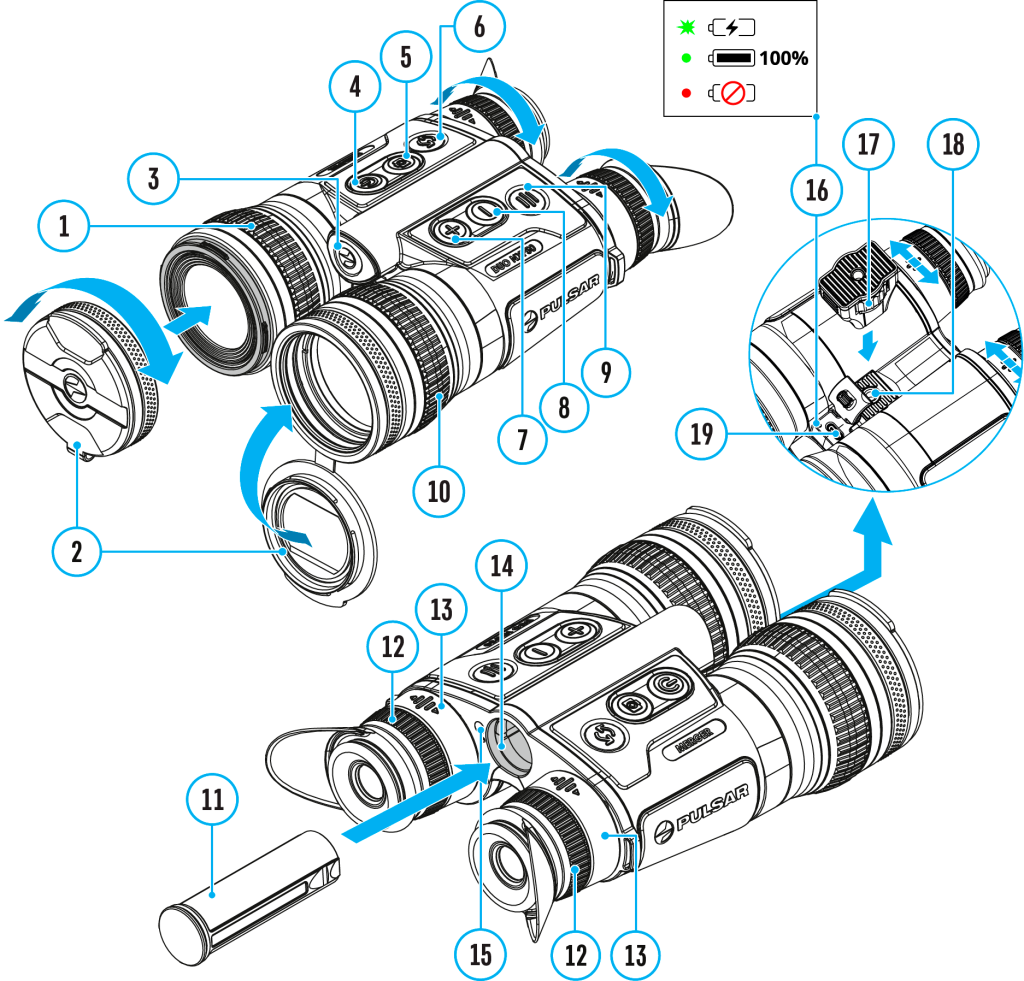
- Digital channel lens focus ring
- Removable lens covers
- Battery release button
- Power ON/OFF/Calibration button
- REC button
- MODE button
- UP/ZOOM navigation button
- DOWN navigation button
- MENU button
- Thermal imaging channel lens focus ring
- Battery APS 3
- Eyepiece dioptre rings
- Eyepieces
- Battery compartment
- Proximity sensor
- LED indication of battery charge in the device
- Tripod adapter
- Socket for mounting a tripod adapter and IR illuminator
- USB Type-C port
Features
- 3 modes of operation: thermal imaging, black-and-white digital and multispectral PiP
- Microbolometer with a resolution of 640×480 pixels
- Digital sensor with a resolution of 1920×1200 pixels
- AMOLED displays with a resolution of 1280×960 pixels
- Classic daytime binocular design
- 8-color display palette
- 3 calibration modes: manual, semi-automatic and automatic
- Long detection distance (up to 1800 m) in thermal imaging mode
- Smooth digital zoom x1 – x8
- 3 levels of sensitivity enhancement (in thermal imaging and multispectral PiP
 modes): Normal, High, Ultra
modes): Normal, High, Ultra - “Picture-in-Picture” mode (in thermal and digital modes)
- Display functions turn off with the proximity sensor
- Defective Pixel Repair function
- Device firmware update using the free Stream Vision 2 App
- Wide operating temperature range -25 °С – +50°С (-13 °F – +122 °F)
- Completely waterproof IPX7
- Tripod mount
- Invisible IR illuminator for enhanced image detail in the digital channel
Video/Audio Recording
- Built-in video and sound recorder
- Integration with iOS and Android devices
- Wi-Fi remote control and viewing using a smartphone
- Storing photos and videos in Cloud when using the Stream Vision 2 App
Battery Pack
- Quick Change Li-Ion Battery Pack APS 3
- Charging from USB Power Bank
- Quick-Charge power delivery
Power supply
Precautions
- Only use the charger supplied with the Battery Pack. The use of any other charger may irreparably damage the Battery Pack or the charger and may cause fire.
- Do not charge the built-in and removable batteries immediately after moving the device and batteries from a cold place to a warm place. Wait at least 30 minutes for the device and batteries to warm up.
- It is not recommended to charge the batteries with a charger connected to the USB port of a computer or laptop. It can damage the computer.
- Do not leave the Battery Pack unattended while charging.
- Never use a modified or damaged charger.
- Do not leave the Battery Pack with a charger connected to the power adapter after charging is complete.
- Do not expose batteries to high temperatures or to a naked flame.
- Do not use batteries as a power source for devices that do not support APS batteries.
- Do not disassemble or bend batteries or charger.
- Do not drop or strike batteries or charger.
- Batteries and charger are not designed to be immersed in water.
- Keep the Battery Pack out of the reach of children.
Recommendations for battery use
- For long-term storage, the built-in and removable batteries should be partially charged – from 50 to 80%.
- Batteries should be charged at an ambient temperature of 0 °C … +35 °C. Otherwise, battery life will be significantly reduced.
- When using batteries at sub-zero ambient temperatures, the battery capacity decreases, this is normal and not a defect.
- Do not use batteries at temperatures outside the range of -25 °C … +50 °C – it may reduce the battery life.
- The battery has a short-circuit protection. Any situation that may cause short-circuiting, however, should be avoided.
Battery charging
Merger Duo binoculars are supplied with a removable and rechargeable APS3 lithium-ion battery pack and a built-in rechargeable lithium-ion battery. The batteries should be charged before first use.
The icons ![]() in the status bar will flash when the battery is low. The batteries need to be charged.
in the status bar will flash when the battery is low. The batteries need to be charged.
Option 1
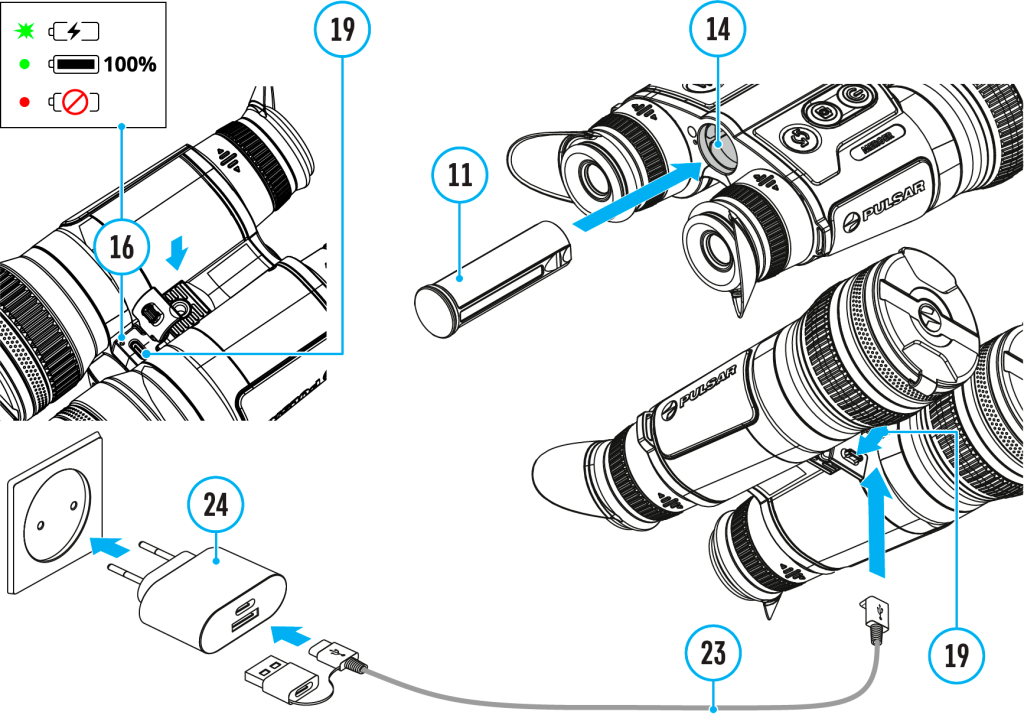
- Install the APS 3 battery (11) in the battery compartment (14) of the device.
- Connect the USB Type-C cable (23) to the USB Type-C connector (19) of the device.
- Connect the other end of the USB cable (23) to the Power Adapter (24) by removing the USB Type-A adapter.
- Plug the Power Adapter (24) into a 100-240 V socket.
- Wait until the batteries are fully charged (indication in the status bar:
 ; 1 – built-in battery, 2 – removable battery).
; 1 – built-in battery, 2 – removable battery).
Note: next to the USB Type-C connector (19) on the device body there is a light-emitting diode (16) to indicate the battery charge level when the device is switched off.
| (16) LED indication | Battery status |
 |
Batteries are charging |
 |
Batteries are charged |
 |
One of the batteries is defective. The device must not be used. The defective battery should be replaced.
Contact Pulsar service to replace the internal battery. |
| – | There is no external battery in the device, or the device is switched on |
Attention! When charging rechargeable batteries via a USB Type-C connector (19) in the device body section:
- Charging priority is given to the built-in battery.
- When the device is off, both batteries are charged at the same time. When using the device, the external battery is discharged first.
- Built-in and removable batteries support USB Power Delivery fast charging technology when using the USB Type-C cable and power adapter supplied with the device.
Option 2
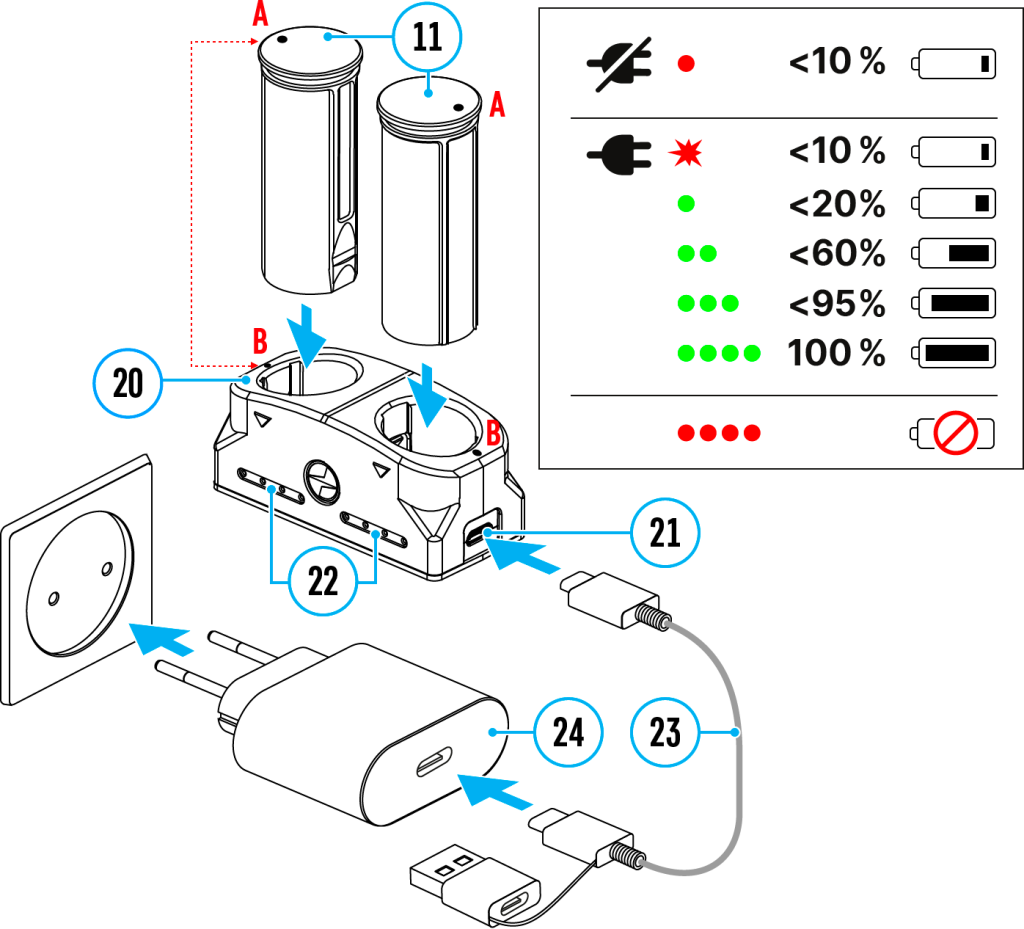
- Insert the Battery Pack (11) along the rail into the APS charger (20) slot as far as it will go. The APS charger is supplied with your device or purchased separately.
- Point A on the battery and point B on the charger should match.
- Connect the USB Type-C plug of the USB cable (23) to the port (21) of the charger (20).
- Connect the second plug of the USB cable (23) to the USB port on the power adapter (24).
- Plug the device into a 100-240 V socket.
- The LED indicator (22) will display battery charge status.
- Wait until the battery is fully charged (LED indication (22):
 ).
). - Two batteries* can be charged at the same time: the second slot is designed for it.
| (22) LED Indicator** | Battery Charge Status |
 |
Battery level is from 0% to 10%. Charger is connected to a power supply. |
 |
Battery level is from 0% to 10%. Charger is not connected to a power supply. |
 |
Battery level is from 10% to 20%. |
 |
Battery level is from 20% to 60%. |
 |
Battery level is from 60% to 95%. |
 |
Battery completely charged. Charging will automatically stop. The battery can be disconnected from the charger. |
 |
Defective battery. Do not use the battery. |
* Purchased separately.
** LED indicator displays the current battery charge status for 30 seconds when the APS charger is not plugged in. When the power is being supplied, the indicator is constantly displaying the current battery charge status, the LEDs are additionally flickering to display the battery charging process.
Battery installation
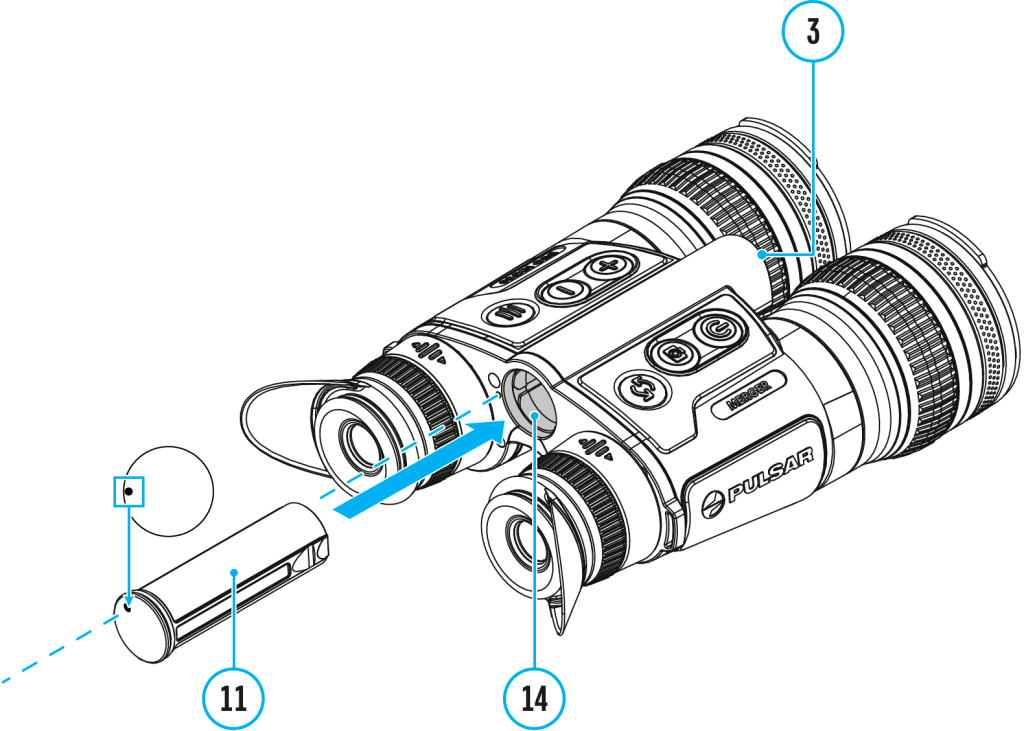
Attention! Before installing the battery, make sure that there is an undamaged rubber insulating ring on the battery. The ring is designed to protect your device from moisture getting inside. Damage to the device due to a missing ring is not covered by the warranty. To replace or purchase a ring, contact your local distributor.
- Install the battery (11) into the battery compartment (14). A pictogram in the form of a “dot” on the battery should be on the left.
- You will hear a click when the battery is placed correctly.
- To remove the battery from the device, press the Battery Release button (3).
Switching and changing the batteries
Merger Duo devices are powered by 2 batteries: built-in Battery Pack and removable Battery Pack APS3.
![]()
- If there are two batteries in the device at the same time, two battery icons are displayed in the status bar (1 – built-in battery, 2 – removable battery). The device battery is displayed in white, inactive – in grey.
- When there is no removable battery in the device, only one icon for the built-in battery displays in white in the status bar.
- When both batteries are fully charged, the device is powered by the removable battery. If there is low removable battery level, the device will switch to the built-in battery.
- Battery charge level is displayed in % above the icon in the status bar while charging.
- It is possible to replace the removable battery even while the device is on.
Attention! When installing a removable battery with a sufficient charge level, the device will automatically switch to it.
External power supply
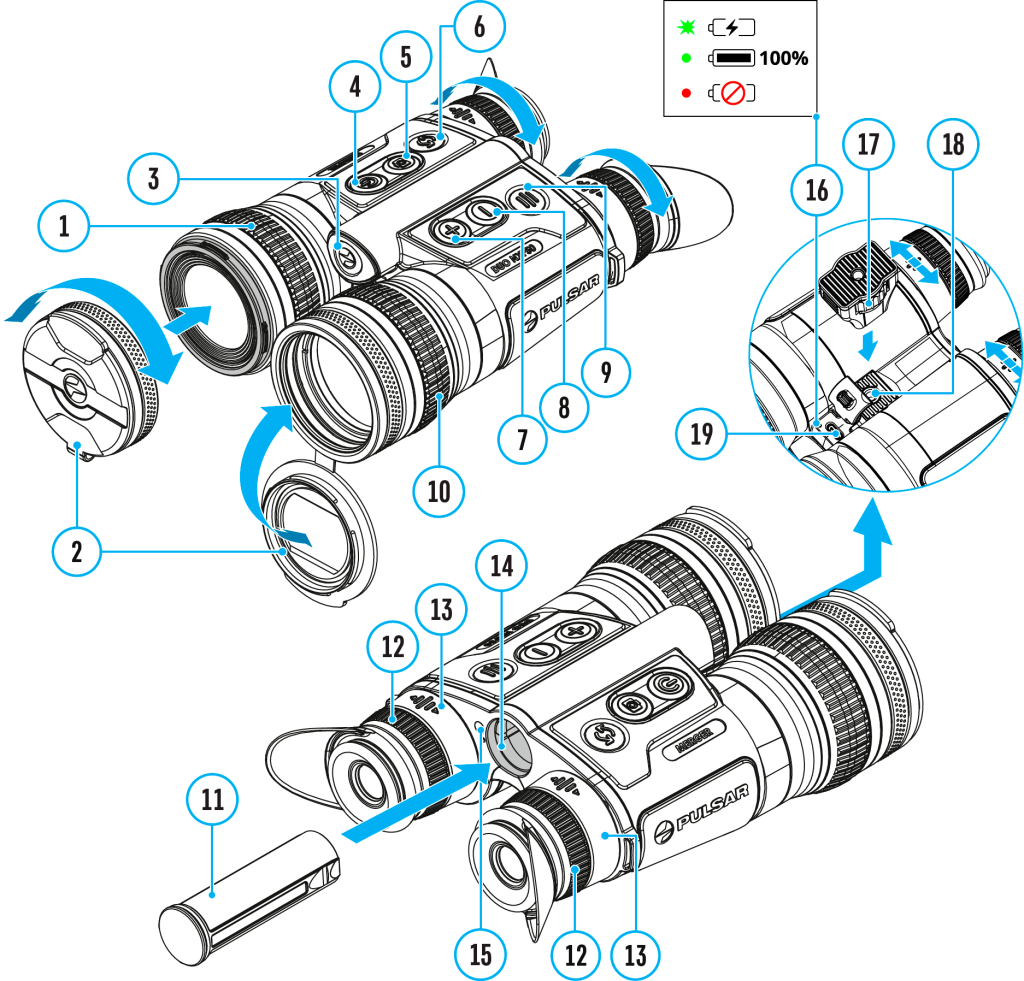
Power can be supplied from an external source such as a 5 V power bank.
- Connect the external power supply to the USB Type-C port (19) of the device.
- The device switches to external power source, while built-in Battery Pack and removable Battery Pack APS3 will gradually recharge.
- The display will show the battery icon
 with charge level as a percentage.
with charge level as a percentage. - If the device is powered by an external power supply, but the APS3 battery is not connected, only the built-in battery will be charged.
- When the external power supply is disconnected, the device switches to the internal battery pack without powering off.
Warning! Charging the built-in battery and the APS3 battery from the power bank at an external temperature below 0 °C (32 °F) can reduce the battery life. When using external power, connect the Power Bank to the device after it has been turned on and working for several minutes.
Getting started
IR illuminator mount

- Open the rubber plug of the USB type-C connector (19) of the device.
- Insert the type-C plug of the IR illuminator (26) into the type-C connector (19). The tripod screw (27) should fit into the tripod socket (18).
- Tighten the tripod screw (27) as far as it will go.
- Adjust the light spot position in the field of vision of the digital channel by tilting the IR illuminator lens forcefully (25).
- To remove the IR illuminator, unscrew the tripod screw (27) and disconnect the IR illuminator from the type-C connector (19) of the device.
Note: the hole in the tripod screw (27) can be used to mount the device on a tripod.
Powering on and image settings

1. Open the lens covers (2).
2. Press the ON/OFF (4) button briefly to power the device on.
3. Adjust the interpupillary distance by moving the eyepieces (13) farther or closer to each other. It takes some effort to move the eyepieces.
4. Adjust the symbol sharpness on the displays by rotating the eyepiece dioptre rings (12). In future, it will not be necessary to rotate the eyepiece dioptre rings, regardless of the distance and other conditions.
5. Briefly press the MODE button (6) to select the desired image mode: thermal or digital.
6. To focus on the observation object, rotate the lens focusing rings of the thermal imaging (10) and digital (1)
7. Long press the MODE button (6) to activate the PiP multispectral mode. Briefly press the MODE button (6) to select the image mode of the PiP window: thermal or digital.
8. In thermal imaging and multispectral PiP  modes:
modes:
- Select the calibration mode: manual (M), semi-automatic (SA) or automatic (A) in the main menu (enter the menu by long pressing the MENU button (9)).
- Calibrate the thermal image by briefly pressing the ON/OFF button (4) (when calibration mode SA or M has been selected). Close the thermal channel lens cover before manual calibration.
- Select the required amplification level for the thermal image (“Normal”
 , “High”
, “High”  , “Ultra”
, “Ultra”  ) by short pressing the DOWN (8)
) by short pressing the DOWN (8) - Activate the smoothing filter
 in the main menu to improve the thermal image as the amplification level increases.
in the main menu to improve the thermal image as the amplification level increases. - Fast switch between the “White hot” palette of the thermal image and the palette selected in the main menu by long pressing the DOWN (8) button.
9. In digital and multispectral PiP  modes with a connected IR illuminator:
modes with a connected IR illuminator:
- Shortly press the DOWN (8) button to turn on the IR illuminator.
- Shortly press the DOWN (8) button to select one of three power levels of the IR illuminator. An increase in power level is required with the increasing distance to the observation object. This increases the discharge rate.
- To turn off the IR illuminator, press and hold the DOWN (8)
10. Adjust the brightness, display contrast, smooth digital zoom in the quick menu (activate by briefly pressing the MENU button (9)).
11. Power the device off with a long press of the ON/OFF button (4).
Notes:
- To prevent accidental decamouflage of the user, the displays automatically turn off when the observer moves the device away from the face.
- When the device approaches the face, the displays will automatically turn on.
- The proximity sensor can be disabled/enabled in the “General settings” section of the main menu.
Observation conditions: time of day, weather, different observation objects affect the image quality. Custom settings for brightness, display contrast as well as the function of adjusting the microbolometer sensitivity level will help to achieve the desired quality in a particular situation.
Warning! Never point the lens at intensive energy sources such as laser radiation emitting devices or the sun. It can damage electronic components in the device. The warranty does not cover damage arising from failure to comply with operating instructions.
Installation of straps on the carrying case and device
The carrying case comes with 2 straps:
1. 2-point strap for carrying the case on your shoulder.
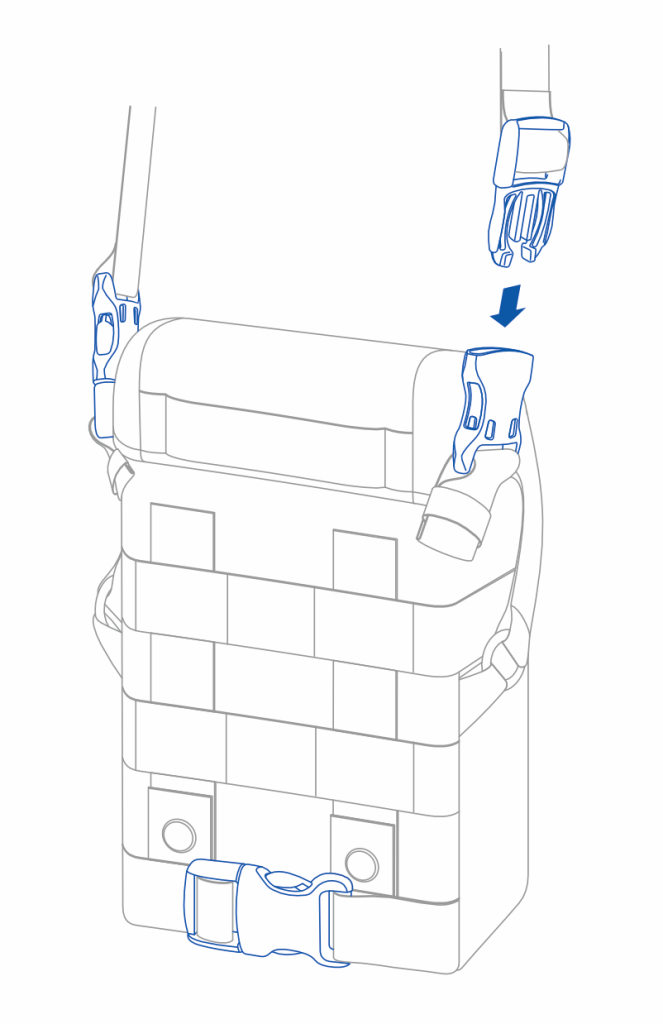
2. 4-point strap for comfortable carrying of the case on the chest during intensive movement and uniform weight distribution.
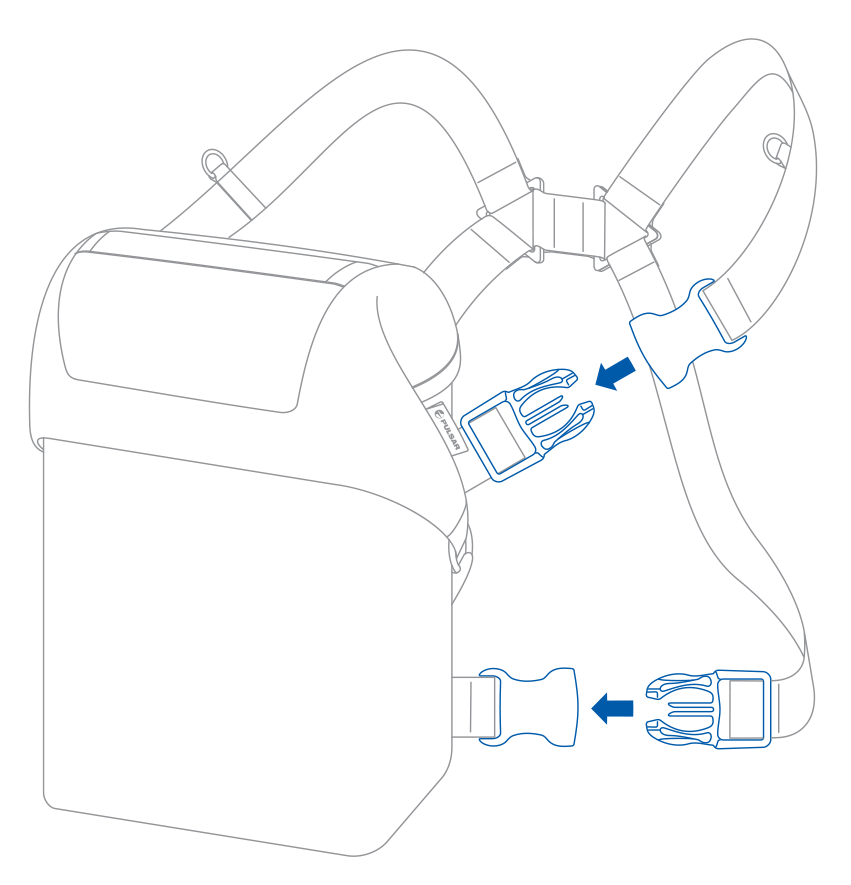
The binoculars are equipped with safety straps with carabiners that can be hooked onto the rings on the 4-point strap or on the neck strap. The length of the safety belts can be adjusted.
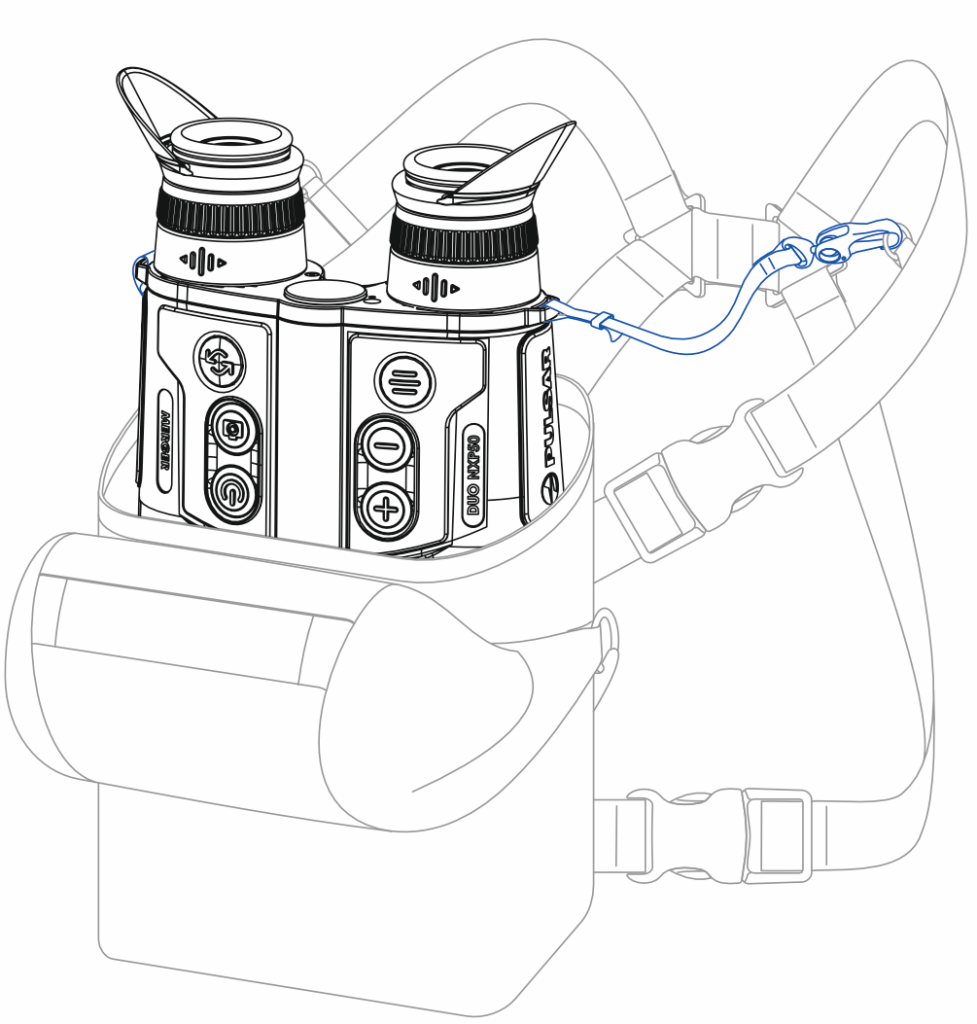
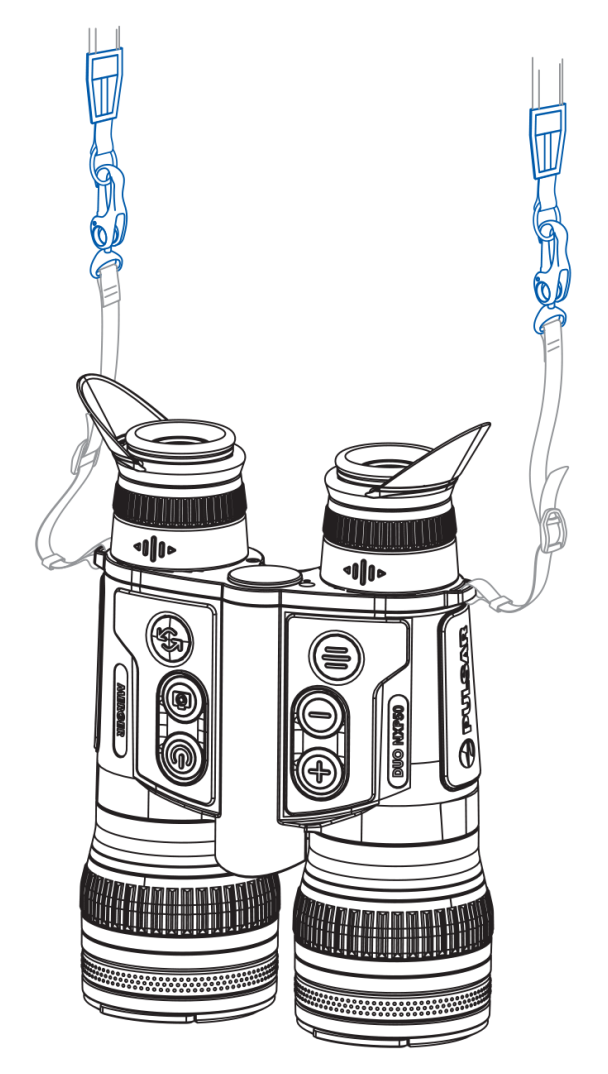
Button operation
| Operation | Button |
| Power device on |  short press short press |
| Power device off |  long press for 3 secs long press for 3 secs |
| Turn display off
(if the proximity sensor is off) |
 long press for less than 3 secs long press for less than 3 secs |
| Turn display on
(if the proximity sensor is off) |
 short press short press |
| Calibrate the microbolometer
(in thermal imaging and multispectral PiP |
 short press short press |
| Image modes switching
(thermal/digital) |
 short press short press |
| PiP multispectral mode activation |  long press long press |
| PiP window image mode switching
(thermal/digital) |
 short press short press |
| Control discrete digital zoom |  short press short press |
| PiP on/off
(in thermal and digital modes) |
 long press long press |
| Switching amplification levels
(in thermal imaging and multispectral PiP |
 short press short press |
| Turn on/off the White Hot palette
(in thermal imaging and multispectral PiP |
 long press long press |
| Video Recorder | Button |
| Start/pause/resume video recording |  short press short press |
| Stop video recording |  long press long press |
| Switch to video / photo |  long press long press |
| Capture Photo |  short press short press |
| Main Menu | Button |
| Enter main menu |  long press long press |
| Navigation upwards/rightwards |  short press short press |
| Navigation downwards/leftwards |  short press short press |
| Confirm selection |  short press short press |
| Exit submenu without confirming selection |  long press long press |
| Exit menu (switch to viewing mode) |  long press long press |
| Quick Menu | Button |
| Enter quick menu |  short press short press |
| Switch between quick menu options |  short press short press |
| Increase value |  short press short press |
| Decrease value |  short press short press |
| Exit quick menu |  long press long press |
| IR-Illuminator
(In digital and multispectral PiP |
Button |
| Activate the IR Illumanator |  short press short press |
| Changing the power level |  short press short press |
| Turn off the IR illuminator |  long press long press |
Interface
Status bar
![]()
The status bar is at the bottom of the image and shows information on the actual operating status of the device, including:
1. Colour Mode (displayed only in thermal imaging and Multispectral PiP modes):
 – White hot
– White hot
 – Black hot
– Black hot
2. Image mode:
 Digital mode
Digital mode
 Thermal imaging mode
Thermal imaging mode
 Multispectral PiP Digital
Multispectral PiP Digital
 Multispectral PiP Thermal
Multispectral PiP Thermal
 Multispectral PiP Digital disabled
Multispectral PiP Digital disabled
 Multispectral PiP Thermal disabled
Multispectral PiP Thermal disabled
The image channel can be disabled in the “Viewing Channel Activation” sub-item of the General Settings section.
3. IR illuminator power level (e.g. Level 3)
4. Amplification level (e.g., Normal; displayed only in thermal imaging and Multispectral PiP modes)
5. Smoothing Filter (displayed when the function is on; displayed only in thermal imaging and Multispectral PiP modes)
6. Calibration mode (a countdown timer  will appear instead of the calibration icon when in automatic calibration mode with 5 seconds remaining until automatic calibration; displayed only in thermal imaging and Multispectral PiP modes)
will appear instead of the calibration icon when in automatic calibration mode with 5 seconds remaining until automatic calibration; displayed only in thermal imaging and Multispectral PiP modes)
7. Microphone
8. Current magnification
9. Wi-Fi connection
10. Clock
11. Power supply:
- Battery discharge level
 (when the device is powered by a built-in or removable battery).
(when the device is powered by a built-in or removable battery). - External battery power indicator
 (when the device is powered by an external power supply).
(when the device is powered by an external power supply). - Battery indicator
 with current percentage of charge (when charging from an external power source).
with current percentage of charge (when charging from an external power source).
Quick menu

The quick menu is used to quickly access the settings for brightness, contrast, smooth digital zoom and use the stadiametric rangefinder.
- Enter the menu with a short press of the МENU (9) button.
- To toggle between the functions below, press successively the МENU (9) button.

Brightness  – press briefly the UP (7)/DOWN (8) buttons to change display brightness from 0 to 20.
– press briefly the UP (7)/DOWN (8) buttons to change display brightness from 0 to 20.
Contrast  – press briefly the UP (7)/DOWN (8) buttons to change display contrast from 0 to 20.
– press briefly the UP (7)/DOWN (8) buttons to change display contrast from 0 to 20.
Smooth digital zoom  – press the UP (7)/DOWN (8) buttons to change digital zoom.
– press the UP (7)/DOWN (8) buttons to change digital zoom.
Smooth digital zoom is in 0.1x increments.
Note: the magnification value is reset to the base value when the device is switched off.
Stadiametric Rangefinder  – change the position of special marker lines to determine the distance to the object being observed by pressing the UP (7)/DOWN (8) buttons (for more details see the Stadiametric Rangefinder section).
– change the position of special marker lines to determine the distance to the object being observed by pressing the UP (7)/DOWN (8) buttons (for more details see the Stadiametric Rangefinder section).
- To exit quick menu, press and hold down the МENU (9) button or wait 5 sec for automatic exit.
Main menu
Enter the main menu

- Enter the main menu with a long press of the МENU (9) button.
- Press the UP (7)/DOWN (8) buttons to switch between the menu options.
- Enter a menu option with a brief press of the МENU (9) button.
- Exit the menu with a long press of the МENU (9) button.
- Automatic exit takes place in 10 sec of inactivity (buttons are not pressed).
Note: When entering the main menu, the background image darkens to enhance the menu visibility. This is normal and not a defect.
General View of the Menu
Tab 1
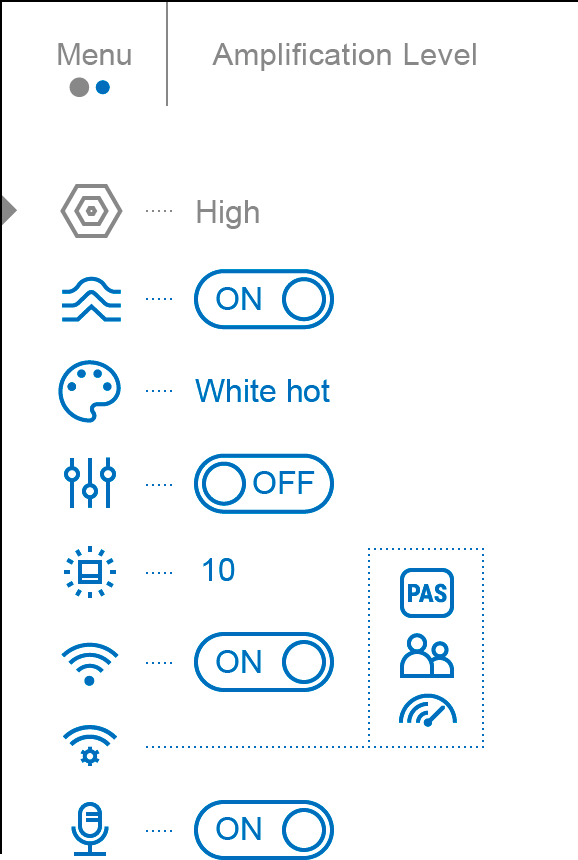
Tab 2
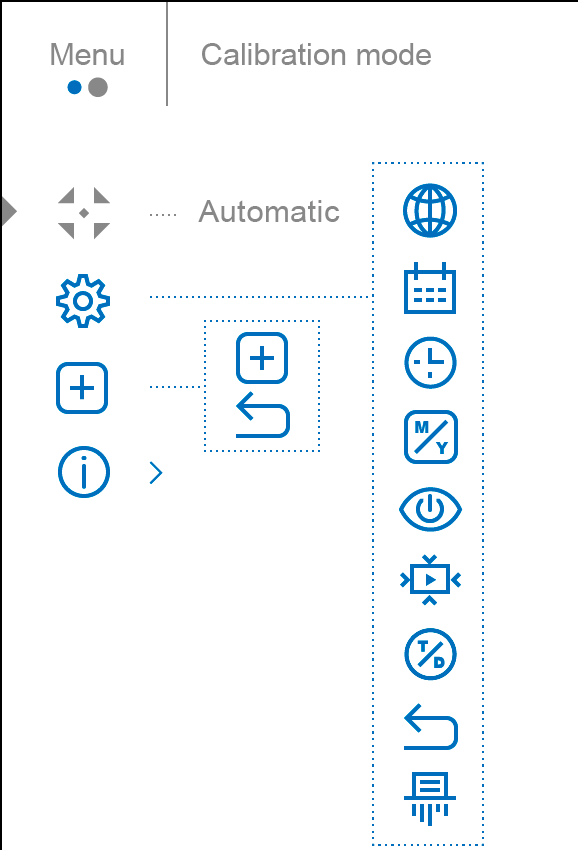
Amplification level

Available in thermal imaging and multispectral PiP modes
Sensitivity enhancement levels (Normal  , High
, High  , Ultra
, Ultra  ) are software algorithms that enhance the quality of detection and recognition in various observation conditions. When the temperature contrast decreases (fog, precipitation, high humidity), it is recommended to increase the amplification level.
) are software algorithms that enhance the quality of detection and recognition in various observation conditions. When the temperature contrast decreases (fog, precipitation, high humidity), it is recommended to increase the amplification level.
To reduce digital distortion, activate the Smoothing Filter in the main menu.
Normal
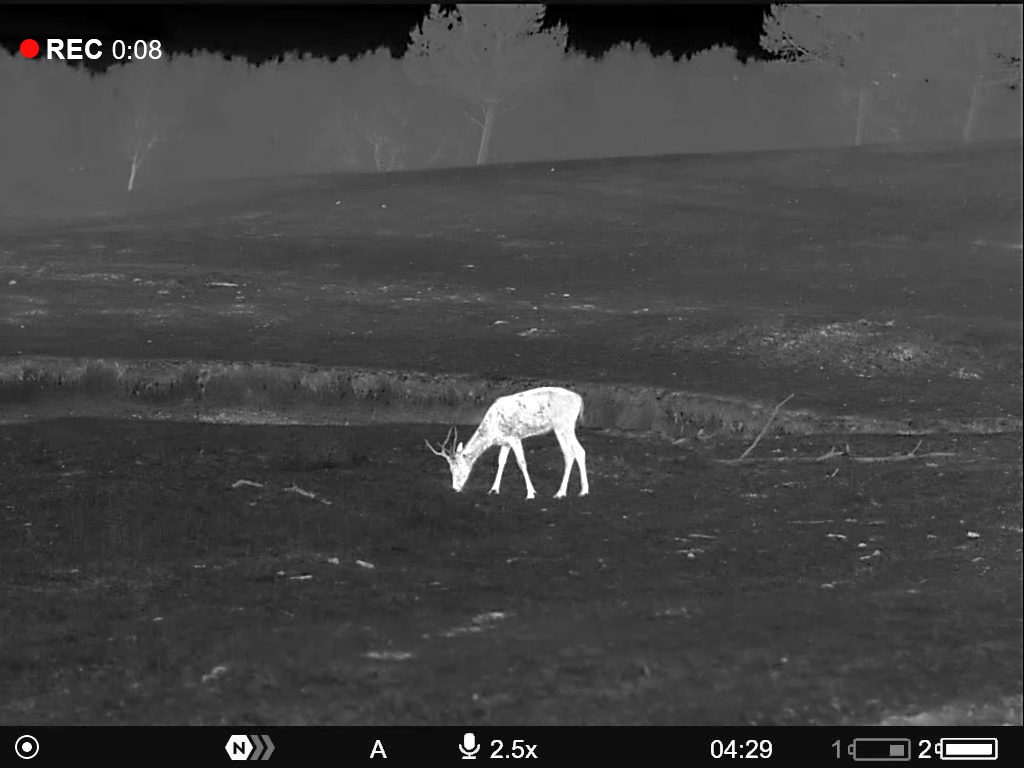
High

Ultra

Option 1:
Press the DOWN (8) button briefly to switch the amplification level.
Option 2:
- Press and hold the MENU (9) button to enter the main menu.
- Use the UP (7)/DOWN (8) buttons to select the Amplification Level
 icon.
icon. - Press the MENU (9) button briefly to enter the Amplification Level submenu.
- Use the UP (7)/DOWN (8) buttons to select one of three amplifying levels of sensitivity (Normal
 , High
, High  , Ultra
, Ultra  ).
). - Press the MENU (9) button briefly to confirm the selection.
Smoothing filter

Available in thermal imaging and multispectral PiP modes
Used to reduce digital distortion while maintaining a high level of sensitivity.
Smoothing Filter Off

Smoothing Filter On
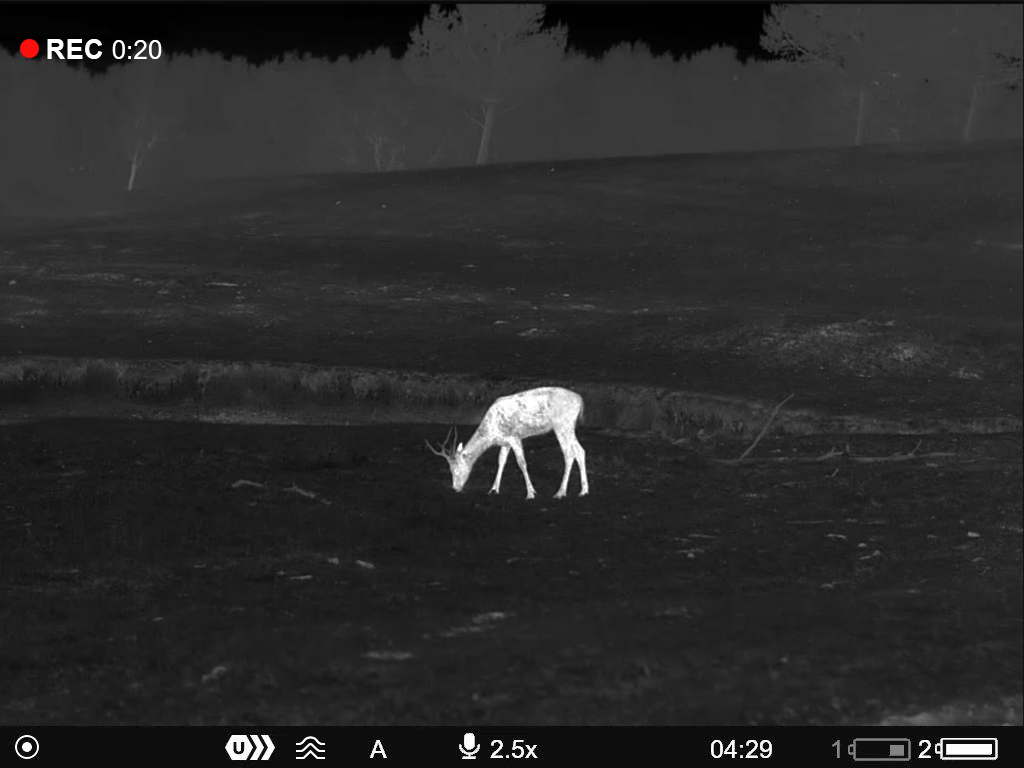
- Press and hold the MENU (9) button to enter the main menu.
- Use the UP (7)/DOWN (8) buttons to select the Smoothing Filter
 icon.
icon. - Press the MENU (9) button briefly to turn the filter on/off.
Colour modes

Available in thermal imaging and multispectral PiP  modes
modes
White hot is the default display mode.
To select another palette:
- Press and hold down the МENU (9) button to enter the main menu.
- Select the Color Modes
 icon with the UP (7)/DOWN (8) buttons.
icon with the UP (7)/DOWN (8) buttons. - Press briefly the МENU (9) button to enter submenu.
- Select the desired palette with the UP (7)/DOWN (8) buttons.
- Confirm your selection with a brief press of the МENU (9) button.
Note: you can also switch from a selected color palette to the White hot palette with a long press of the DOWN (8) button.
Tip: to preserve brightness and contrast values when switching palettes, activate User Mode.

- White hot – a black and white palette where black = cold; white = hot
- Black hot – a black and white palette where white = cold; black = hot
- Red Hot
- Red Monochrome
- Rainbow
- Ultramarine
- Violet
- Sepia
Attention! The device should not be used to accurately measure temperature. The images generated are based on temperature contrast rather than true temperature readings.
User mode

Available in thermal imaging and multispectral PiP modes
The User Mode function saves selected brightness and contrast settings in the device’s memory providing optimal image quality for the next use of the thermal imager immediately, with no additional adjustments needed.
- Press and hold the MENU (9) button to enter the main menu.
- Use the UP (7)/DOWN (8) buttons to select the User Mode
 icon.
icon. - Press the MENU (9) button briefly to turn the mode on/off.
Icon brightness

Icon brightness
- Press and hold the MENU (9) button to enter the main menu.
- Use the UP (7)/DOWN (8) buttons to select the Icon Brightness icon
 .
. - Press the MENU (9) button briefly to enter the submenu.
- Use the UP (7)/DOWN (8) buttons to select the desired brightness level from 0 to 10.
- Press the MENU (9) button briefly to confirm the selection.
Wi-fi activation

- Press and hold down the МENU (9) button to enter the main menu.
- Select the Wi-Fi Activation
 menu option with the UP (7)/DOWN (8) buttons.
menu option with the UP (7)/DOWN (8) buttons. - Turn Wi-Fi on/off with a short press of the МENU (9) button.
Wi-fi settings

This menu option allows you to set up your device for operation in a Wi-Fi network.
- Press and hold down the MENU (9) button to enter the main menu.
- Select the Wi-Fi Settings
 menu option with the UP (7)/DOWN (8) buttons.
menu option with the UP (7)/DOWN (8) buttons. - Press briefly the MENU (9) button to enter submenu.
- Select the desired menu item with the UP (7)/DOWN (8) buttons.
Password Setup
This menu option allows you to set a password to access your binoculars from an external device.
The password is used to connect an external device (i.e. smartphone) to your thermal imager.
- Press briefly the MENU (9) button to enter the Password Setup
 submenu.
submenu. - The unique password only for your device will appear on the image.
- Use the UP (7)/DOWN (8) buttons to set the desired password using the UP button to increase and the DOWN button to decrease the values.
- Switch between digits with a short press of the MENU (9) button.
- Save the password and exit the submenu with a long press of the MENU (9) button.
Access Level Setup
This menu option allows you to set required access level of the Stream Vision 2 application to your device.
- Access level Owner. The Stream Vision 2 user has the complete access to all device’s functions.
- Access level Guest. The Stream Vision 2 user has the access only to the real time video stream from the device.
- Press briefly the MENU (9) button to enter the Access Level Setup
 submenu.
submenu. - Select the access level with the UP (7)/DOWN (8) buttons.
- Press and hold the MENU (9) to confirm your selection and exit from the submenu.
Wi-Fi Band
This setting helps to solve smartphone connection issues in the following cases:
- If your smartphone does not support 5 GHz Wi-Fi band, switch to 2.4 GHz.
- Many Wi-Fi networks cause interference. In this case, switching between Wi-Fi bands can improve the connection between the device and the smartphone.
- Press briefly the MENU (9) button to enter the Wi-Fi Band
 submenu.
submenu. - Press the UP (7)/DOWN (8) buttons to select the WiFi bandwidth – 5 GHz or 2.4 GHz.
- Confirm your selection with a short press of the controller MENU (9) button.
Microphone

Turning on/off Microphone
This item allows you to enable (or disable) the microphone for recording sound during video recording.
- Press and hold the MENU (9) to enter the main menu.
- Select the Microphone
 menu item with the UP (7)/DOWN (8) buttons.
menu item with the UP (7)/DOWN (8) buttons. - To turn on the microphone, briefly press the MENU (9) button.


- To turn off the microphone, briefly press the MENU (9) button.


Calibration mode

Calibration mode selection.
Calibration enables the device to equalize the microbolometer background temperature and eliminate the image flaws (such as vertical bars, phantom images, etc.).
There are three calibration modes: Manual, Semi-Automatic and Automatic.
The selected calibration mode is displayed in the status bar (see Status Bar section).
Select the required mode in the Calibration Mode menu item:
- Press and hold the MENU (9) button to enter the main menu.
- Use the UP (7)/DOWN (8) buttons to select the Calibration Mode
 icon.
icon. - Press the MENU (9) button briefly to enter the submenu.
- Use the UP (7)/DOWN (8) buttons to select one of the calibration modes described below.
- Press the MENU (9) button briefly to confirm the selection.
M mode (Manual)
- Close the lens cover (2) of the thermal imaging channel.
- Press the ON/OFF (4) button briefly.
- Open the lens cover (2) after the calibration is completed.
SA mode (Semi-Automatic)
- The user independently determines the need for calibration (according to the image being observed).
- Press the ON/OFF (4) button briefly to activate calibration.
- There is no need to close the lens cover because an internal shutter covers the microbolometer automatically.
A mode (Automatic)
- The device is calibrated autonomously according to firmware algorithms.
- There is no need to close the lens cover because an internal shutter covers the microbolometer automatically.
- In this mode, the user can still choose to calibrate the device using the ON/OFF (4) button if required (as in the SA mode).
- A countdown timer
 will appear instead of the calibration icon when in automatic calibration mode with 5 seconds remaining until automatic calibration.
will appear instead of the calibration icon when in automatic calibration mode with 5 seconds remaining until automatic calibration.
Notes:
- During calibration, the image on the display briefly freezes for up to 1 second.
- The selected calibration mode is saved after restarting the device.
General settings

- Press and hold down the МENU (9) button to enter the main menu.
- Select option General Settings
 with the UP (7)/DOWN (8) buttons.
with the UP (7)/DOWN (8) buttons. - Press briefly the МENU (9) button to confirm.
The following settings are available:
Language
Selecting interface language
- Select option Language
 with the UP (7)/DOWN (8) buttons.
with the UP (7)/DOWN (8) buttons. - Press briefly the МENU (9) button to confirm.
- Select one of the available interface languages with a short press of the UP (7)/DOWN (8) buttons: English, German, Spanish, French, Russian, Italian, Portuguese, Dutch, Danish, Norwegian, Swedish, Polish, Czech, Hungarian.
- Press briefly the МENU (9) button to confirm.
Date
Date setup
- Select option Date
 with UP (7)/DOWN (8) buttons.
with UP (7)/DOWN (8) buttons. - Press briefly the МENU (9) button to confirm. Date format is displayed as: YYYY/MM/DD (year/month/day)
- Select the correct values for the year, month and date with a short press of the UP (7)/DOWN (8) buttons.
- Switch between digits with a short press of the МENU (9) button.
- Save selected date and exit the submenu with a long press of the МENU (9) button.
Time
Time setup
- Select option Time
 with UP (7)/DOWN (8) buttons.
with UP (7)/DOWN (8) buttons. - Press briefly the МENU (9) button to confirm.
- Select the desired time format with a short press of the UP (7)/DOWN (8) buttons: 24 or PM/AM.
- Switch to hour setup with a brief press of the МENU (9) button.
- Select hour value with a brief press of the UP (7)/DOWN (8) buttons.
- Switch to minute setup with a brief press of the МENU (9) button.
- Select minute value with a brief press of the UP (7)/DOWN (8) buttons.
- Save selected time and exit the submenu with a long press of the МENU (9) button.
Units of Measure
Selection of units of measurement
- Select option Units of Measure
 with UP (7)/DOWN (8) buttons.
with UP (7)/DOWN (8) buttons. - Press briefly the МENU (9) button to confirm.
- Select the desired unit of measurement – meters or yards – with UP (7)/DOWN (8) buttons.
- Press briefly the МENU (9) button to confirm.
- Exit to general settings submenu takes place automatically.
Proximity Sensor
This feature allows you to disable/enable the display to turn off automatically when the device moves away from the user’s face.
When the proximity sensor is off, the display can be turned on/off by pressing the ON/OFF (4) button.
By default, the proximity sensor is on.
- Use the UP (7)/DOWN (8) buttons to select Proximity Sensor
 .
. - Press the MENU (9) button briefly to turn the sensor on/off.
Video Compression
When set to ON, standard video compression is applied so the video file size is reduced.
When set to OFF, minimal video compression is applied. In this case, the quality of the recorded video is better, but its size is significantly increased.
Warning! Larger video file sizes result in shorter recording times. This may lead to longer download times for video files through the Stream Vision 2 app.
Enable/disable video compression:
- Select the Video Compression
 menu item with the UP (7)/DOWN (8) buttons.
menu item with the UP (7)/DOWN (8) buttons. - To turn on video compression, briefly press the МENU (9) button.

- To turn off video compression, briefly press the МENU (9) button.

Viewing Channel Activation
This submenu allows you to turn off one of the image channels (thermal imaging or digital) if it is not used.
Turning off the image channel will save battery power.
An icon with a disabled channel will be displayed in the status bar:  or
or  .
.
Turn on/off the image channel:
- Use the UP (7)/DOWN (8) buttons to select the Viewing Channel Activation
 menu item.
menu item. - Press the MENU (9) button briefly to enter the submenu.
- Use the UP (7)/DOWN (8) buttons to select the image mode: thermal imaging or digital.
- Confirm your selection with a short press of the MENU (9) button.
- Turn on/off the image channel by briefly pressing the MENU (9) button.
Default Settings
Restore default settings
- Select option Default Settings
 with UP (7)/DOWN (8) buttons.
with UP (7)/DOWN (8) buttons. - Press briefly the МENU (9) button to confirm.
- With a short press of the UP (7)/DOWN (8) buttons select “Yes” to restore default settings or “No” to abort.
- Confirm selection with a brief press of the МENU (9) button.
- If “Yes” is selected, display will show “Do you want to restore default settings?” with “Yes” and “No” dialogue options. Select “Yes” to restore default settings.
- If “No” is selected, action is aborted and you return to the submenu.
The following settings will be restored to their original values before changes made by the user:
- Video recorder mode – Video
- Amplification Level – Normal
- Smoothing Filter – Off
- User Mode – Off
- Calibration mode – automatic
- Language – English
- Microphone – Off
- Wi-Fi – Off (default password)
- Magnification – Off (no digital zoom)
- PiP – Off
- Color mode – White Hot
- Unit of measurement – Metric
- Video Compression – Off
- Wi-Fi Band – 2.4 GHz
- Proximity Sensor – On
- Viewing Channel Activation – both channels are on
Attention! When restoring the factory defaults the date, time and user pixel map are saved.
Format
This item allows you to format the Flash-card (memory card) of the device (this will delete all files from the memory card).
Formatting should be carried out in case of a memory card error.
Before formatting, make sure you transfer all footage to other media.
- Select option Format
 with UP (7)/DOWN (8) buttons.
with UP (7)/DOWN (8) buttons. - Press briefly the МENU (9) button to confirm.
- With a short press of the UP (7)/DOWN (8) buttons select “Yes” to format the memory card or “No” to return to the submenu.
- Confirm selection with a short press of the МENU (9) button.
- If “Yes” is selected, display will show “Do you want to format memory?” with “Yes” and “No” dialogue options. Select “Yes” to format the memory card.
- If “No” is selected, formatting is aborted and you return to the submenu.
How to fix dead pixels of a thermal imaging microbolometer
Defective pixel repair

When using the device, defective (dead) pixels may appear on the microbolometer. These are bright or dark points of a constant brightness that are visible on the thermal image.
Defective pixels on the microbolometer can increase in size relative to the digital-zoom power.
Merger Duo binoculars allow the user to remove any defective pixels on the display, as well as cancel removal, via the device’s firmware.
![]()
Step 1. Enter the menu to fix the defective pixels
- Select the thermal imaging mode for the main window by briefly pressing the MODE (6) button.
- Press and hold the MENU (9) button to enter the main menu.
- Use the UP (7)/DOWN (8) buttons to select the Defective Pixel Repair
 menu item.
menu item. - Press briefly the MENU (9) to open the submenu.
- Select the Defective Pixel Repair
 option by briefly pressing the MENU (9) button.
option by briefly pressing the MENU (9) button.
Step 2. Select the defective pixel
- A marker (H)
 will appear on the left side of the image.
will appear on the left side of the image. - A “magnifier” (G) will appear on the right side of the image – an enlarged image in a frame with a fixed marker
 , designed for easier detection of a defective pixel and to match the pixel with the marker, and horizontal and vertical arrows for X and Y axes (I) showing the marker’s movement.
, designed for easier detection of a defective pixel and to match the pixel with the marker, and horizontal and vertical arrows for X and Y axes (I) showing the marker’s movement. - With a short press of the UP (7)/DOWN (8) buttons move the marker to align it with a defective pixel.
- Switch the direction of the marker from horizontal to vertical and vice versa with a short press of the MENU (9) button.
- Align the defective pixel with the fixed cross in the frame – the pixel should disappear.
Step 3. Remove the defective pixel
- Delete the defective pixel with a short press of the ON/OFF (4).
- Once the pixel has been successfully deleted an “OK” message will briefly appear on the screen.
- Then, by moving the marker across the image, you can delete the next defective pixel.
- Exit the Defective Pixel Repair submenu with a long press of the MENU (9).
Warning! On each of the two displays of the device, 1-2 pixels in the form of bright white or coloured (blue, red) dots are allowed. They are not removed and are not a defect.
Restore default pixel map

This option allows you to cancel deletion of the defective pixels and return them to the original state.
- Press and hold down the МENU (9) button to enter the main menu.
- Select the Defective Pixel Repair
 menu item with the UP (7)/DOWN (8) buttons.
menu item with the UP (7)/DOWN (8) buttons. - Press briefly the МENU (9) button to open the submenu.
- Select Restore Default Pixel Map
 menu item with the UP (7)/DOWN (8) buttons.
menu item with the UP (7)/DOWN (8) buttons. - Press briefly the МENU (9) button.
- Using the UP (7)/DOWN (8) buttons, select “Yes” if you wish to return to default defective pixel pattern, or “No” if you do not.
- Confirm selection with a short press of the МENU (9) button.
Device information

This option allows the user to view the following information about the device:
- Full name
- SKU number
- Serial number
- Firmware version
- Hardware version
- Service information
To display information, do the following:
- Press and hold down the МENU (9) button to enter the main menu.
- Select option Device Information
 with the UP (7)/DOWN (8) buttons.
with the UP (7)/DOWN (8) buttons. - Press briefly the МENU (9) button to confirm.
Functions
Image modes (Thermal Imaging/Digital/Multispectral Pip)

The device has 3 image modes: thermal imaging, digital and multispectral PiP mode.
- Quickly switch between thermal and digital modes by briefly pressing the MODE (6) button.
- Activate the multispectral PiP mode by a long press of the MODE (6) button.
- In the multispectral PiP mode, the image channels in the PiP window are switched by briefly pressing the MODE (6) button.
Thermal Imaging Mode
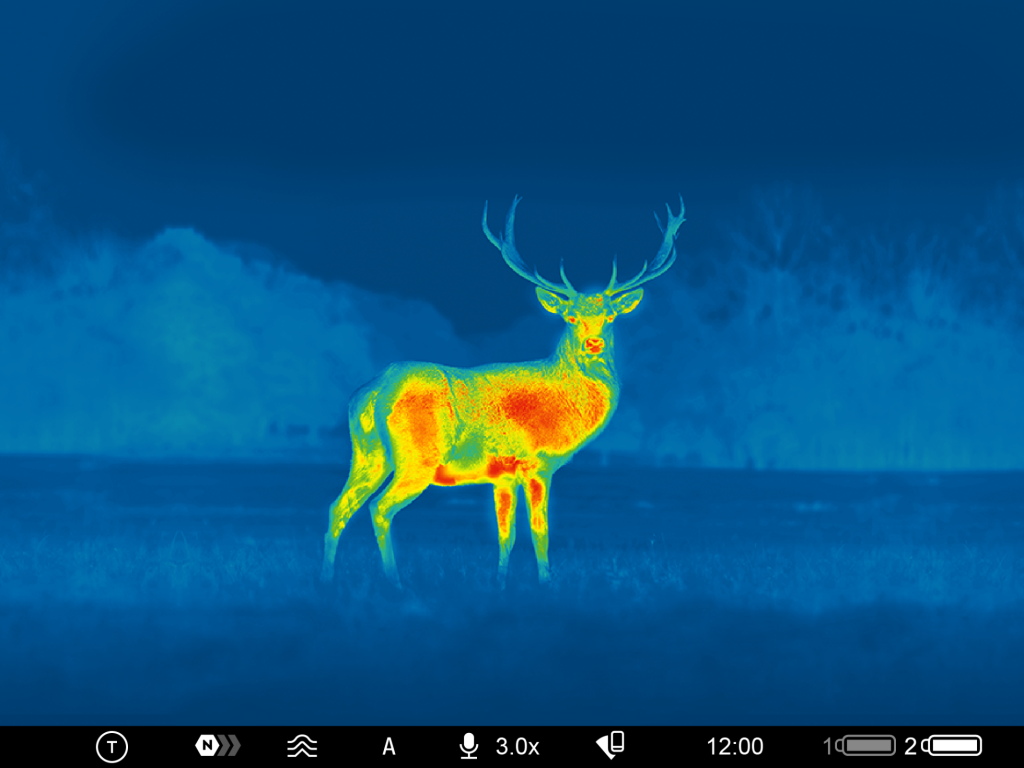
The device displays an image from a thermal imaging microbolometer when using the thermal imaging mode.
This mode allows you to use the device both at night-time and during the day in adverse weather conditions (fog, snow, haze) when there are obstacles (branches, tall grass, dense bushes etc.) that make it difficult to detect the target.
In thermal imaging mode, the riflescope does not need an external light source and is resistant to high light levels.
Digital Mode
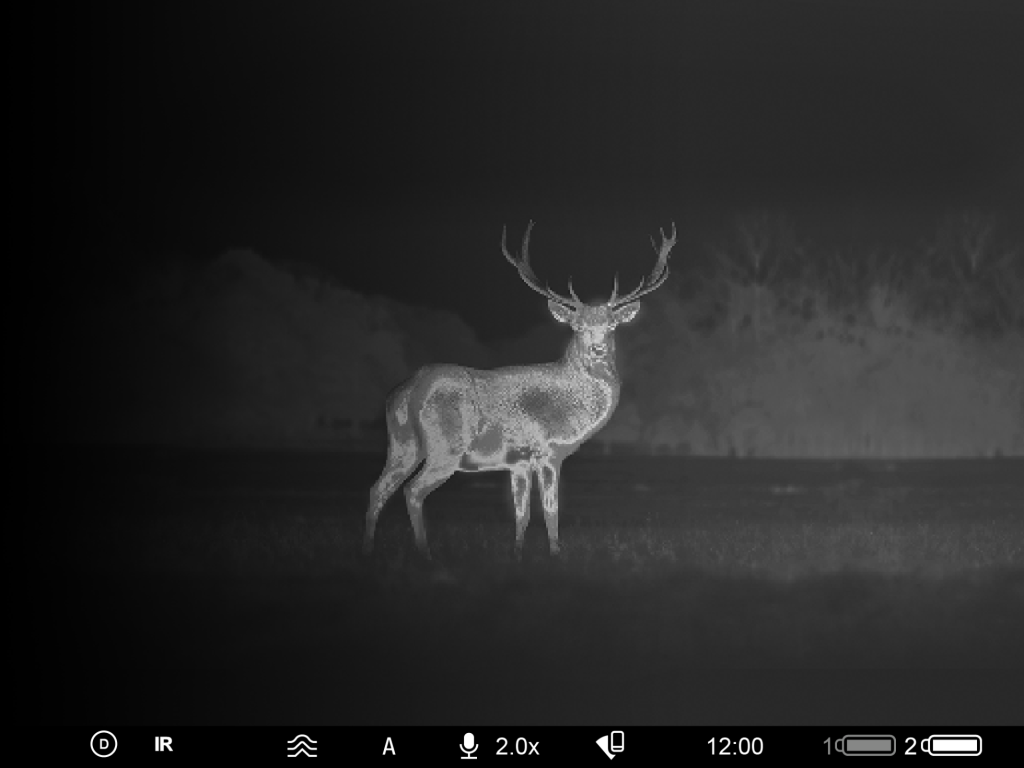
In digital mode, the device generates a black and white image from a digital sensor.
In this mode, the device allows observation both day and night. In night conditions (absence of starlight, moonlight), it is recommended to use an infrared illuminator ith a wavelength of 940 nm.
Multispectral PiP
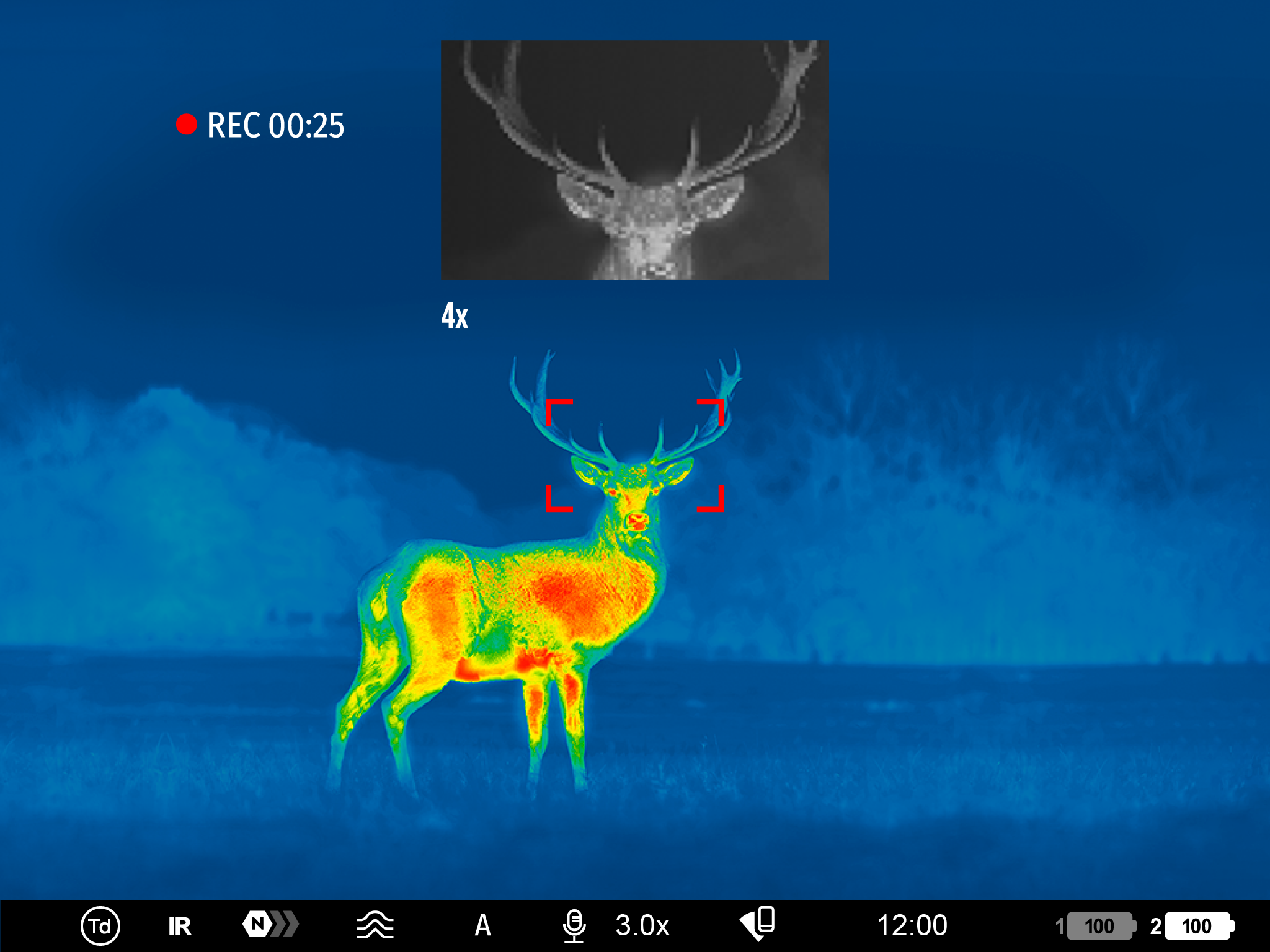
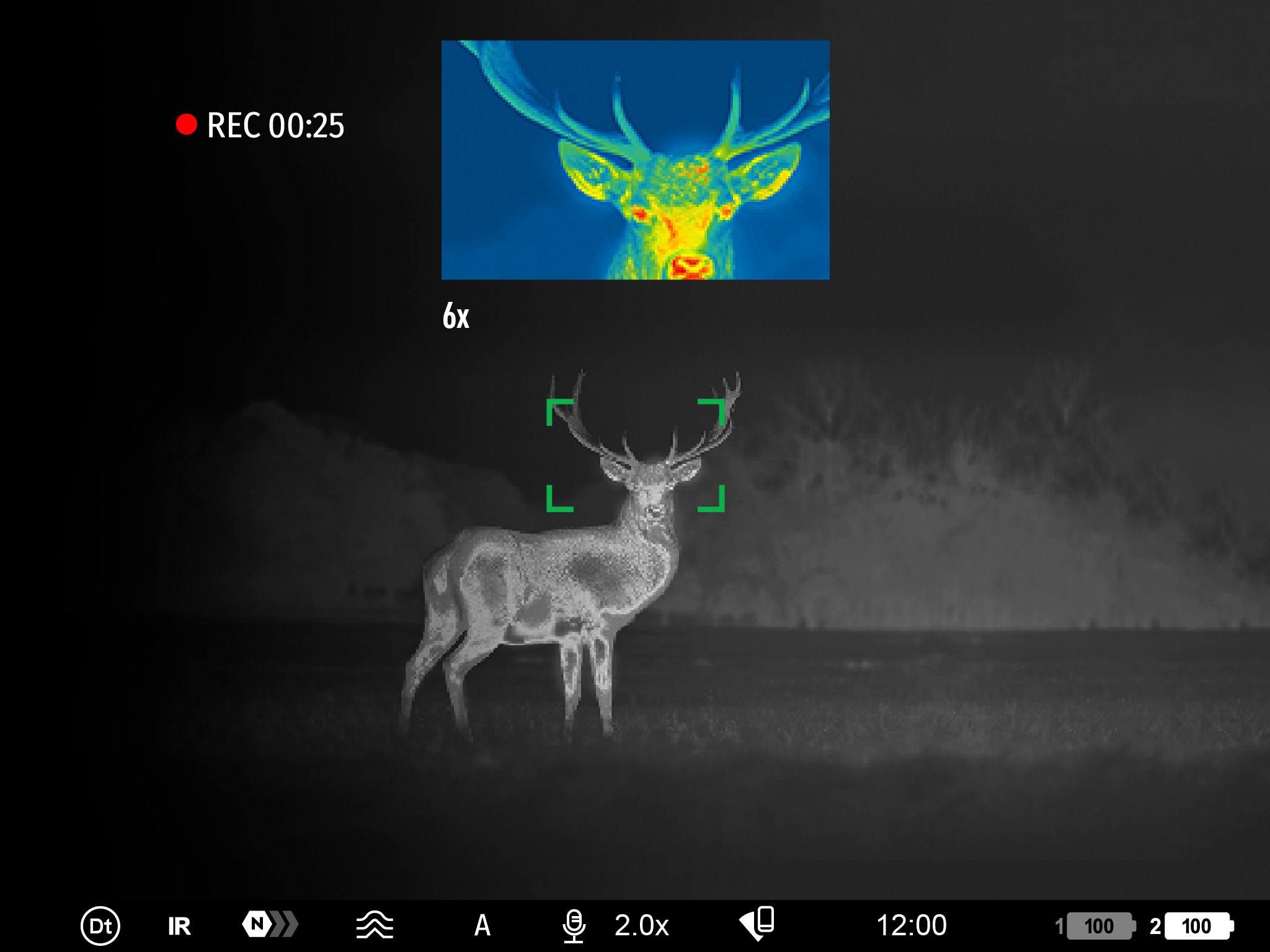
In the multispectral PiP mode, the image of one channel is displayed in the main window, and the image of the second channel is displayed in the PiP window.
In this mode, digital zoom is applied only to the PiP window. The magnification in the main window is set to base.
Video recording and photography

Merger Duo binoculars feature video recording and photography of the image being ranged to the internal memory card.
Before using the photo and video functions, read the Date and Time subsections of the General Settings section.
For information on how to watch recorded photos and videos, see the Stream Vision 2 user manual: Android, iOS.
Built-in recorder operates in two modes:
- Photo (photography; the icon
 is displayed in the upper left corner of the image).
is displayed in the upper left corner of the image).
- Video (video recording; the icon
 is displayed in the upper left corner of the image, the total remaining recording time is given taking into account the current resolution in the HH:MM format (hours:minutes).
is displayed in the upper left corner of the image, the total remaining recording time is given taking into account the current resolution in the HH:MM format (hours:minutes).
Switching between the operating modes of the video recorder is done by long pressing the REC (5) button. Switching between the modes is cyclical (Video–> Photo–> Video…).
Photo mode. Capturing an image

1. Switch to the Photo mode with a long press of the REC (5) button.
2. Press the REC (5) button briefly to capture a photo. The icon  flashes – the photo file is being saved to the built-in SD card.
flashes – the photo file is being saved to the built-in SD card.
Video mode. Recording a video

1. Switch to the Video mode with a long press of the REC (5) button.
2. Press the REC (5) button briefly to start video recording.
3. When the video recording starts, the icon ![]() will disappear, instead of it the REC icon as well as the video recording timer displayed in the MM:SS (minutes:seconds) format will appear
will disappear, instead of it the REC icon as well as the video recording timer displayed in the MM:SS (minutes:seconds) format will appear ![]() .
.

4. Pause/continue recording by briefly pressing the REC (5) button.
5. Press and hold the REC (5) button to stop video recording.
Video files are stored in the built-in memory card:
- After turning off the video recording;
- Upon powering the device off if recording was on;
- When the memory card is overfilled during recording (Memory Full message appears).
Notes:
- You can enter and navigate the menu during video recording.
- Recorded videos and photos are saved to the built-in memory card of the device in the format img_xxx. jpg (for photos); video_xxx. mp4 (for video).
- Videos are recorded in clips with a maximum duration of 5 minutes. The number of recorded files is limited by the capacity of unit’s internal memory and video compression ratio.
- Regularly check free memory within the built-in memory card and move the footage to other storage media to free up the memory card space.
- In case of a memory card error, you can use the format function in the General Settings section of the main menu.
- When the Display Off function is activated, video recording continues to run in the background.
Discrete digital zoom


The device allows you to quickly increase the basic magnification (please refer to the Magnification line in the Specifications table) by 2, 4 or 8 times.
- To operate the discrete digital zoom, press successively the UP/ZOOM (7) button.
- The digital zoom will not be saved after the device is re-started.
Note: the magnification value is reset to the base value when the device is switched off.
PIP function

Available in thermal imaging and digital mode
PiP (“Picture in Picture”) allows you to see a zoomed image simultaneously with the main image in a dedicated window.
In this mode, the same image channel is displayed in the main window and the PiP window.
To use the multispectral PiP mode, see Image Modes (Thermal Imaging/Digital/Multispectral PiP).
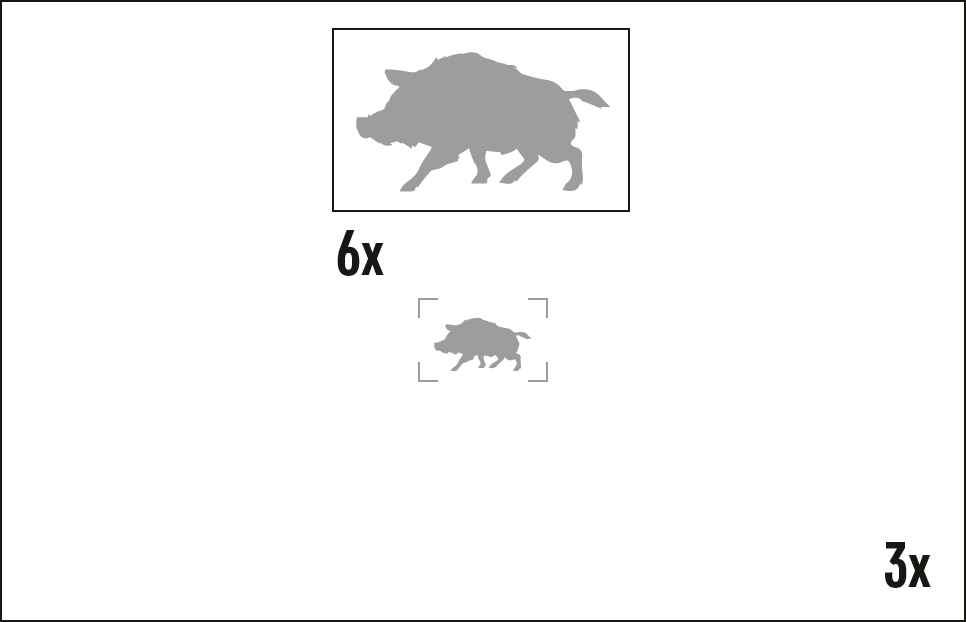
- Turn on/off the PiP function with a long press of UP/ZOOM (7) button.
- Change zoom ratio in the PiP window with a short press of UP/ZOOM (7) button.
- The zoomed image is displayed in a dedicated window, while the image in the rest of the screen is displayed at base magnification.
- When PiP is turned on, you can operate the discrete and continuous digital zoom. The magnification will take place only in the dedicated window.
- When PiP is turned off, the image is shown with the optical magnification set for the PiP function.
Display-Off function

This function darkens the screen, which aids the user’s concealment. However, the device stays on.

The displays can be turned off automatically if the proximity sensor is turned on or by pressing the ON/OFF (4) button if the proximity sensor is turned off.
The proximity sensor is turned on:
- When the device moves away from the user’s face, the displays will turn off.
- When the device approaches the user’s face, the displays will turn on again.
- While holding the ON/OFF (4) button, a countdown icon
 will appear on the displays and the device will turn off.
will appear on the displays and the device will turn off.
The proximity sensor is turned off:
- When the device is on, press and hold the ON/OFF (4) button. The displays will turn off, the current time and the “Display off” icon will appear.
- Turn the displays back on with a short press of the ON/OFF (4) button.
- When you press and hold the ON/OFF (4) button, the displays show the “Display off” icon with a countdown. Pressing & holding the button down for the duration of the countdown will power the device off completely.
Wi-fi function
The device has a function enabling wireless communication with external devices (smartphone or tablet) via Wi-Fi.
- Turn on the wireless module in the WI-Fi Activation
 menu option.
menu option.
Wi-Fi operation is shown in the status bar as follows:
| Status bar indication | Connection status |
 |
Wi-Fi is off |
 |
Wi-Fi activated by the user,
Wi-Fi in the device is being activated |
 |
Wi-Fi is on, no connection with device |
 |
Wi-Fi is on, device connected |
- Your device is detected by an external device as “MERGER_XXXX”, where XXXX – is the last four digits of device’s serial number.
- After entering the password on a mobile device (see Password Setup subsection of the Wi-Fi Settings section for more information on setting a password) and connection is established, the icon
 in the status bar will change to
in the status bar will change to  .
. - The Wi-Fi function will turn off automatically if there is not enough battery power for Wi-Fi. The battery icons will turn red
 and flash. To use the Wi-Fi function again, you need to charge the batteries.
and flash. To use the Wi-Fi function again, you need to charge the batteries. - When Wi-Fi is on, the power supply will switch to the internal battery after the external battery reaches a 20% charge level.
Stadiametric rangefinder

Merger Duo binoculars are equipped with a stadiametric rangefinder which allows the user to determine the approximate distance to an object of a known size with reasonable accuracy.

- Select the Stadiametric Rangefinder function with short presses of the MENU (9) button until the icon
 is selected.
is selected. - You will see on the display: measurement bars, icons of three reference objects and respective distances for the three objects.
- Position the lower fixed bar under the object being ranged.
- By pressing the UP (7)/DOWN (8) buttons, move the upper horizontal bar relative to the lower fixed bar until the object fits entirely between the two bars. The distance to the object is automatically recalculated as you move the upper line.
- Exit the rangefinder mode with a long press of the MENU (9) button or wait 10 seconds to exit automatically.
Notes:
- There are three predefined values for the reference objects: Hare – 0.3 m height, Boar – 0.7 m height, Deer – 1.7 m height.
- Before it appears on the display, a measured distance value is rounded up to 5m for larger values and rounded down to 1m for smaller values.
- To select the unit of measurement (Meters or Yards), go to the General Settings
 menu item => Units of Measure
menu item => Units of Measure  submenu.
submenu.
Installing the device on a tripod
Using a tripod adapter
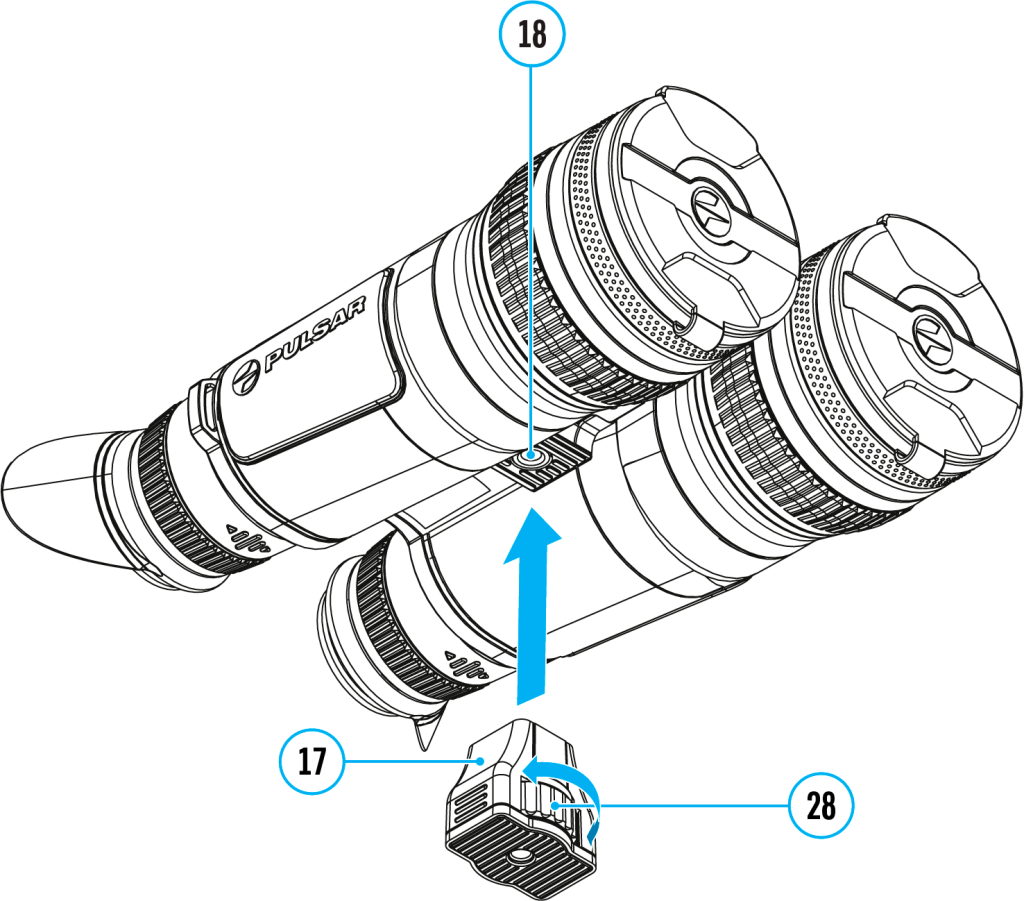
- Attach the tripod adaptor (17) to the socket (18).
- Screw the adapter wheel (28) clockwise until it stops.
- Secure the adaptor with the device on a tripod.
Using an IR illuminator
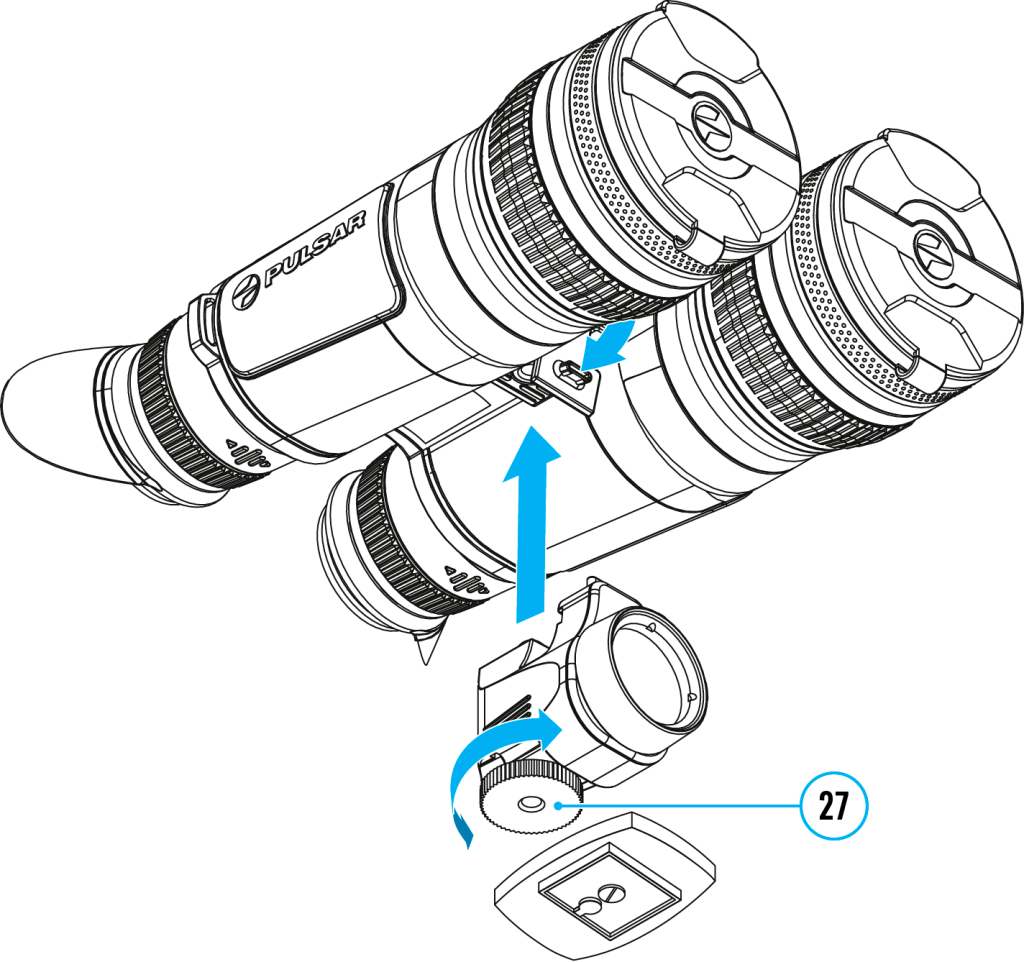
- Install the IR illuminator on the device.
- Screw the tripod adapter platform to the hole in the tripod screw (27).
- Install the device with the platform on a tripod.
USB connection


- Connect one end of the USB cable to the USB Type-C (17) connector of the device, the other one to the port on your computer using a USB Type-A adapter.
- Turn the device on with a short press of the ON/OFF (4) button (device that has been turned off cannot be detected by your computer).
- Your device will be detected by the computer automatically; no drivers need to be installed.
- Two connection modes will appear on the image: Power and Memory Card (external memory).
- Select connection mode with UP (7)/DOWN (8) buttons.
- Confirm selection with a short press of the MENU (9) button.
Power
- In this mode, when a computer is used as an external power supply, the icon
 appears in the status bar. The device will continue operating and all functions are available.
appears in the status bar. The device will continue operating and all functions are available. - The Battery pack installed in the device is not being charged!
- A battery recharge feasibility depends on your computer’s USB port.
Memory Card
- In this mode the device is detected by the computer as a flash card.
- This mode is designed for work with the files saved in device’s memory. The device’s functions are not available in this mode; the device turns off automatically.
- If video recording was in progress when connection was made, recording stops and video is saved.
USB Disconnection
- When the USB is disconnected from the device connected as the Power mode, the device continues operating from the rechargeable batteries if they are sufficiently charged.
- If the device is in Memory Card mode and is disconnected from USB, the device will remain on.
Software
Stream vision 2

Install the Stream Vision 2 application to download files, update firmware, control the device by remote control and broadcast images from your device to a smartphone or a tablet via WiFi.
We recommend using the latest version – Stream Vision 2.

You can find further guidelines on Stream Vision 2 here.
Download from Google Play
Download from App Store
Find answers to frequently asked questions about using Stream Vision 2 here.
Stream Vision 2 Manual
Firmware update
- Download the free Stream Vision 2 App in Google Play or App Store.
- Connect your Pulsar device to your mobile device (smartphone or tablet).
- Launch Stream Vision 2 and go to section “Settings”.
- Select your Pulsar device and press “Check firmware update”.
- Wait for the update to download and install. Pulsar device will reboot and will be ready to operate.
Important:
- if your Pulsar device is connected to a phone or mobile device, please turn on mobile data transfer (GPRS/3G/4G) to download update;
- if your Pulsar device is not connected to your phone or mobile device but is already listed in “Settings” > “My devices” section, you may use Wi-Fi to download update.
Find answers to frequently asked questions about using Stream Vision 2 here.
Is your firmware up to date?
Click here to check the latest firmware for your device.
Maintenance
Technical inspection
It is recommended to inspect your device before each use. Check the following:
- The device should be free of any cracks or deformations.
- The lenses should be free of cracks, grease, dirt or debris.
- The battery level of the device should be full. Electrical sockets should be free of salts, oxidation, or other debris.
- All controls should be responsive.
Technical maintenance
Maintenance should be carried out at least twice a year and should include the following steps:
- Wipe the exterior surfaces of metal and plastic parts with a cotton cloth. Do not use chemically active substances, solvents, etc. as these will damage the paint.
- Clean the electric terminals of the Battery Pack and device’s battery slot using a grease-free organic solvent.
- Check the lenses of the eyepieces and objectives. If necessary, remove dust and sand from the optics (it is preferable to use a non-contact method). Cleaning of the exterior surfaces of the optics should be done with cleaners designed especially for this purpose.
- Avoid getting repellent on the housing of the device. This may damage the appearance of the housing coating.
Storage
- Always store the device in its carrying case in a dry, well-ventilated space.
- Remove the Battery Pack for long-term storage.
Troubleshooting
For technical support please contact support@pulsar-vision.com.
Answers to frequently asked questions about the devices can also be found in the FAQ section.
The device does not turn on
Possible cause
The batteries are completely discharged.
Solution
Charge the batteries.
Device malfunction
Solution
In case of any malfunctions during operation, try resetting the device by long pressing the ON/OFF button for 10 seconds.
The device does not operate on external power supply
Possible cause
USB cable is damaged.
Solution
Replace USB cable.
Possible cause
The external power supply is discharged.
Solution
Charge the external power supply.
The thermal image is blurry, with vertical stripes and uneven background
Possible cause
Calibration is required.
Solution
Carry out calibration according to Calibration Mode section.
Black screen after calibration
Solution
If the image does not clear after calibration, you need to recalibrate.
When the device is turned on, the calibration frequency is at first higher, then decreases (if the automatic calibration mode is enabled)
Possible cause
After turning on the device, it takes some time for the sensor temperature to stabilize. This is normal and is not a defect.
Colored lines appeared on display or image has disappeared
Possible cause
The device was exposed to static electricity during operation.
Solution
After exposure to static electricity, the device may either reboot automatically, or require turning off and on again.
The image is too dark
Possible cause
Brightness or contrast level is too low.
Solution
Adjust the brightness or contrast level in the Quick Menu.
Poor image quality / Detection range reduced
Possible cause
Problems described may arise in adverse weather conditions (snow, rain, fog etc.).
The device is not focused
Possible cause
Wrong settings.
Solution
Adjust the device according to the Powering on and Image Setting section.
Check the outer surfaces of the lenses and the eyepieces and, where necessary, wipe away dust, condensation, frost, etc. In cold weather, you can use special anti-fogging coatings (e.g., the same as for corrective glasses).
Smartphone or tablet cannot be connected to the device
Possible cause
Password in the device was changed.
Solution
Delete network and connect again inserting the password saved in the device.
Possible cause
There are too many Wi-Fi networks in the area where the device is located which may cause signal interference.
Solution
To ensure stable Wi-Fi performance, move the device to an area with few or no Wi-Fi networks.
Solution
Switch the device’s Wi-Fi band.
Possible cause
The device has a 5 GHz network enabled, but the smartphone only supports 2.4 GHz.
Solution
Switch the device’s Wi-Fi band to 2.4 GHz.
More information on solving problems with connection to Stream Vision 2 by following the link.
Wi-Fi signal is missing or interrupted
Possible cause
Smartphone or tablet is out of range of a strong Wi-Fi signal. There are obstacles between the device and the smartphone or tablet (e.g., concrete walls).
Solution
Relocate smartphone or tablet into the Wi-Fi signal line of sight.
More information on solving problems with connection to Stream Vision 2 by following the link.
The image of the object being observed is missing in the thermal imaging mode
Possible cause
The object is behind glass, which obstructs thermal vision.
Solution
Remove the glass.
There are several light or black dots (pixels) on device’s displays, microbolometer or digital sensor
Solution
The presence of such pixels is associated with the manufacturing technology of displays and microbolometers or digital sensors. It is not a defect.
When using the device at below zero temperatures the thermal image quality is worse than at positive temperatures
Possible cause
In warm climates, objects in the background of a thermal image heat up differently because of thermal conductivity, generating a high temperature contrast and a sharper thermal image.
In cold climates, objects in the background of a thermal image will cool down to roughly the same temperature, which leads to a greatly reduced temperature contrast and a degraded image quality. This is normal for all thermal imaging devices.
There is no thermal imaging or digital image
Possible cause
Lens cover closed.
Solution
Open the covers of the thermal imaging and digital channels.
Possible cause
Channel is turned off.
Solution
Turn on the desired channel in the “Viewing Channel Activation”  item of the General Settings section in the main menu.
item of the General Settings section in the main menu.
The image of the digital channel is overexposed when direct sunlight hits the binocular lens
Possible cause
If direct sunlight hits the binocular digital channel lens during daytime observation, the image may be overexposed. The device has a highly sensitive digital sensor and is intended primarily for night observation.
Solution
Do not use the device in both modes (digital and thermal imaging) opposite the sun, as well as in digital mode at night in front of bright oncoming light sources (car headlights, street lamps, etc.). Deterioration in image quality when using the device in this way is not a defect.
Legal compliances and disclaimers
Attention! A license is required for the Merger Duo multispectral binoculars when exporting outside your country.
Electromagnetic Compliance
This product complies with EU Standard EN 55032:2015, Class A.
Warning! Operation of this equipment in a residential environment could cause radio interference.
Updates of the Product. The manufacturer reserves the right at any time, without mandatory prior notice to the Customer, to make changes to the package contents (subject to the applicable laws, if any), design and characteristics that do not impair the quality of the Product.
Repair. Repair of the product is available within 5 years after purchase of the product.
Limitation of Liability. Subject to mandatory applicable laws and regulations: manufacturer will not be liable for any claims, actions, suits, proceedings, costs, expenses, damages or liabilities (if any), arising out of the use of this product. Operation and use of the product are the sole responsibility of the Customer. Manufacturer’s sole undertaking is limited to providing the product(s) and related services in accordance with the terms and conditions of concluded transactions, including provisions established in warranty. The provision of products sold and services performed by Manufacturer to the Customer shall not be interpreted, construed, or regarded, either expressly or implied, as being for the benefit of or creating any obligation toward any third party (other than Distributor, Dealer, Buyer). Manufacturer’s liability hereunder for damages, regardless of the form or action, shall not exceed the fees or other charges paid to Manufacturer for the product(s) and/or service(s).
MANUFACTURER WILL NOT BE LIABLE FOR LOST REVENUES OR INDIRECT, SPECIAL, INCIDENTAL, CONSEQUENTIAL, EXEMPLARY, OR PUNITIVE DAMAGES, EVEN IF THE MANUFACTURER KNEW OR SHOULD HAVE KNOWN THAT SUCH DAMAGES WERE POSSIBLE AND EVEN IF DIRECT DAMAGES DO NOT SATISFY A REMEDY.
